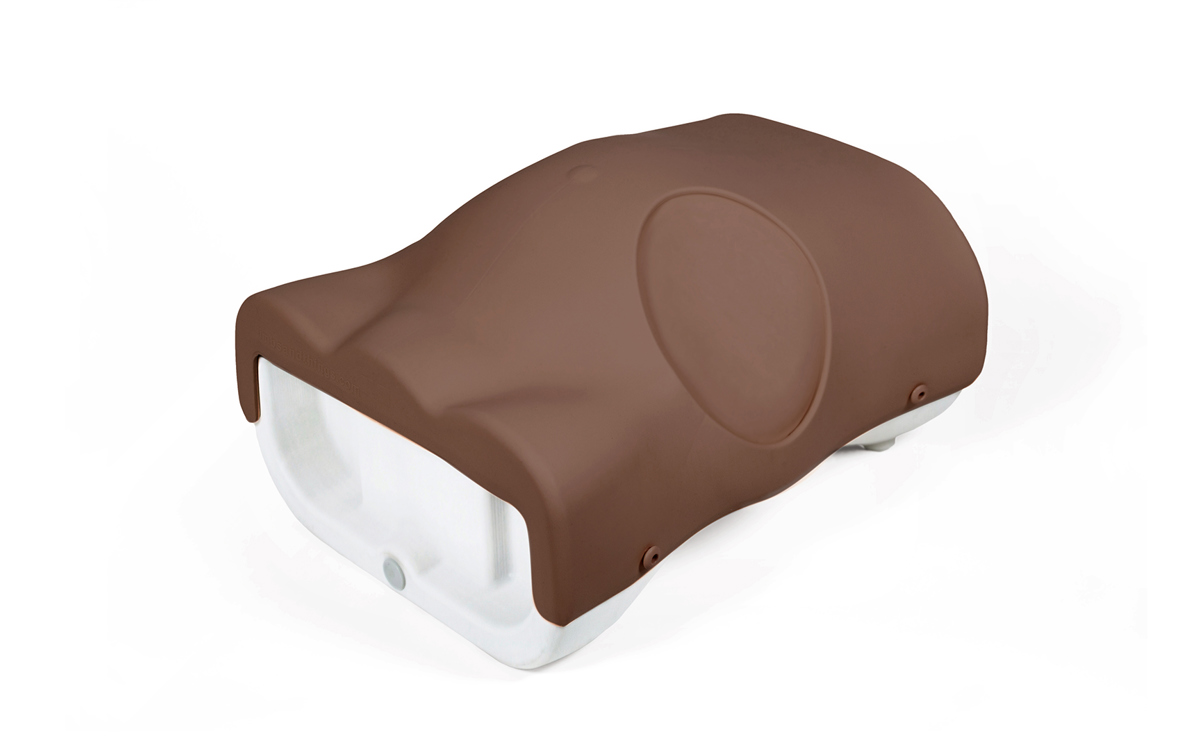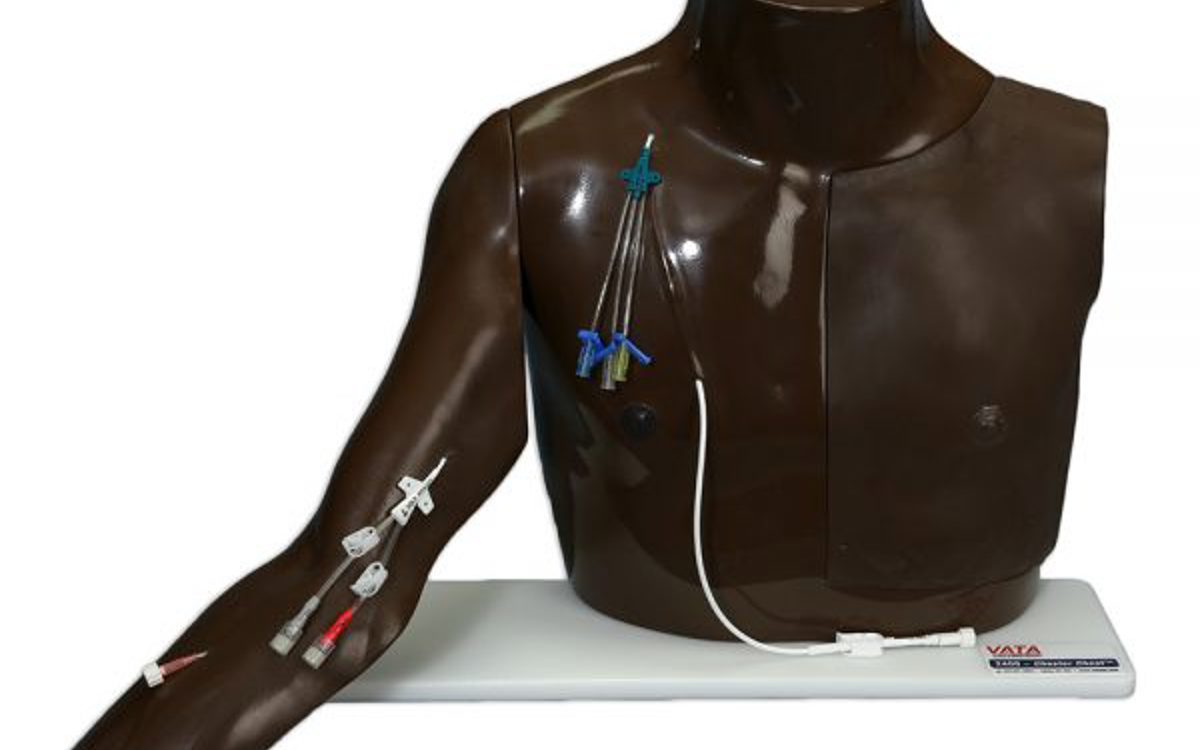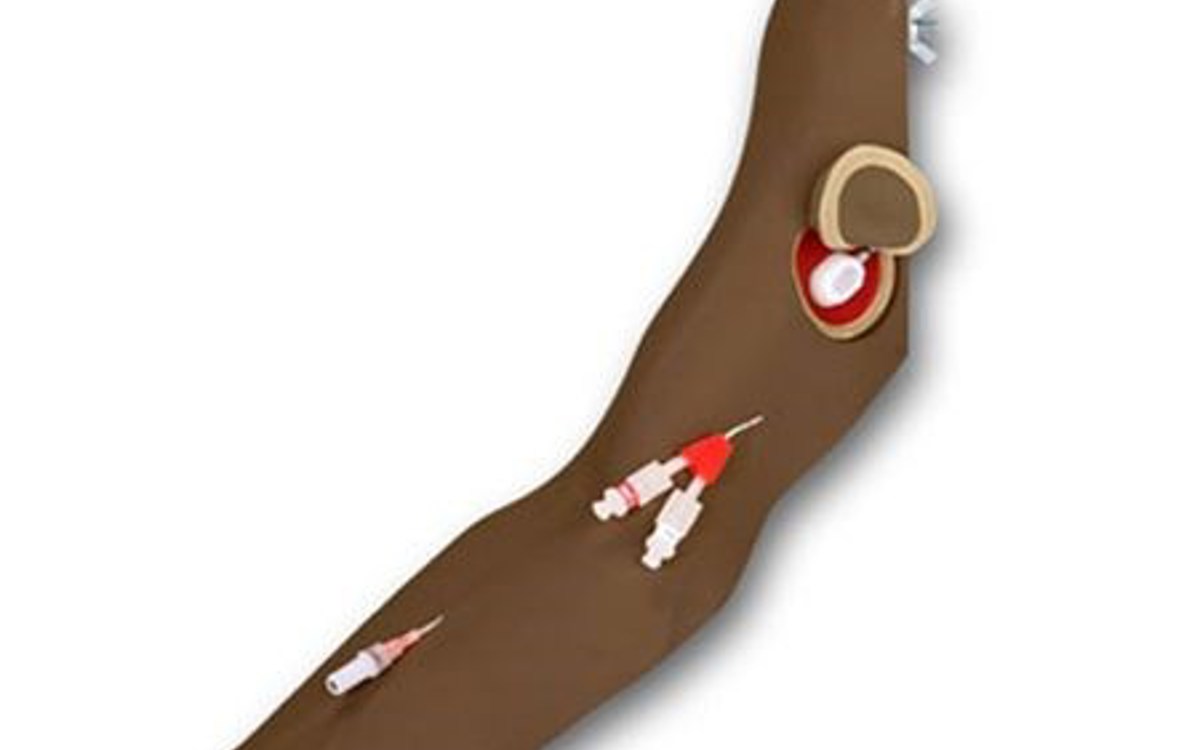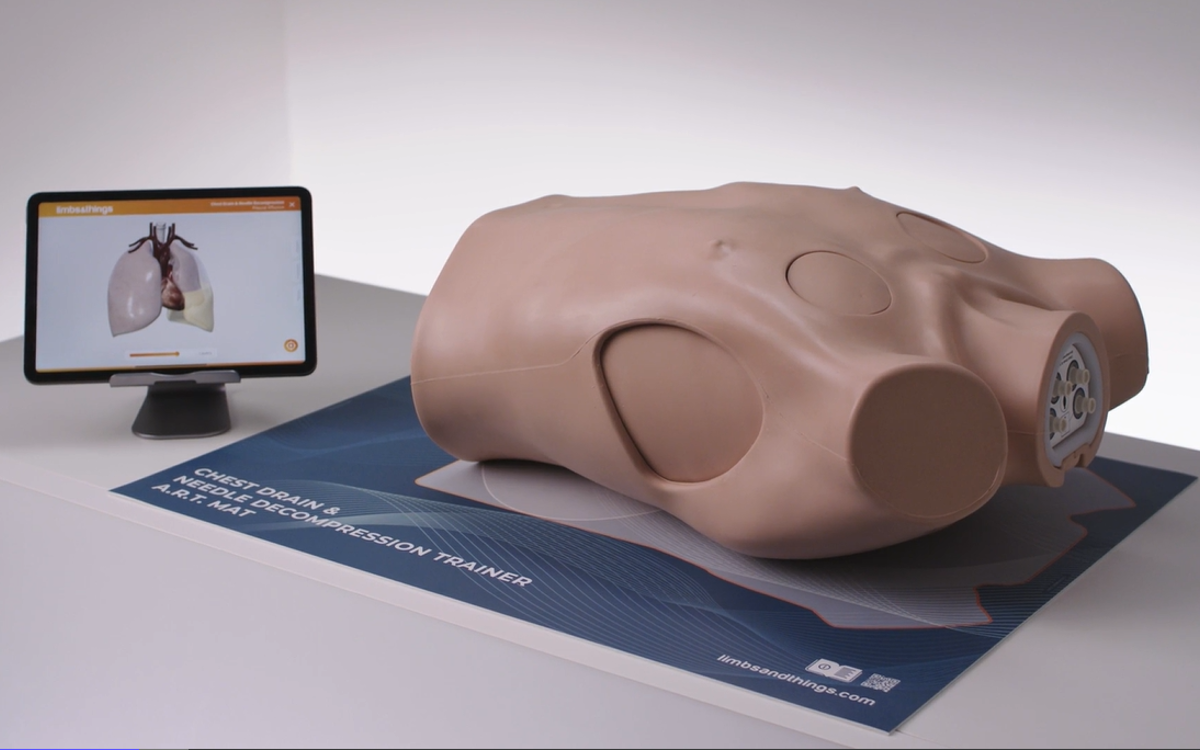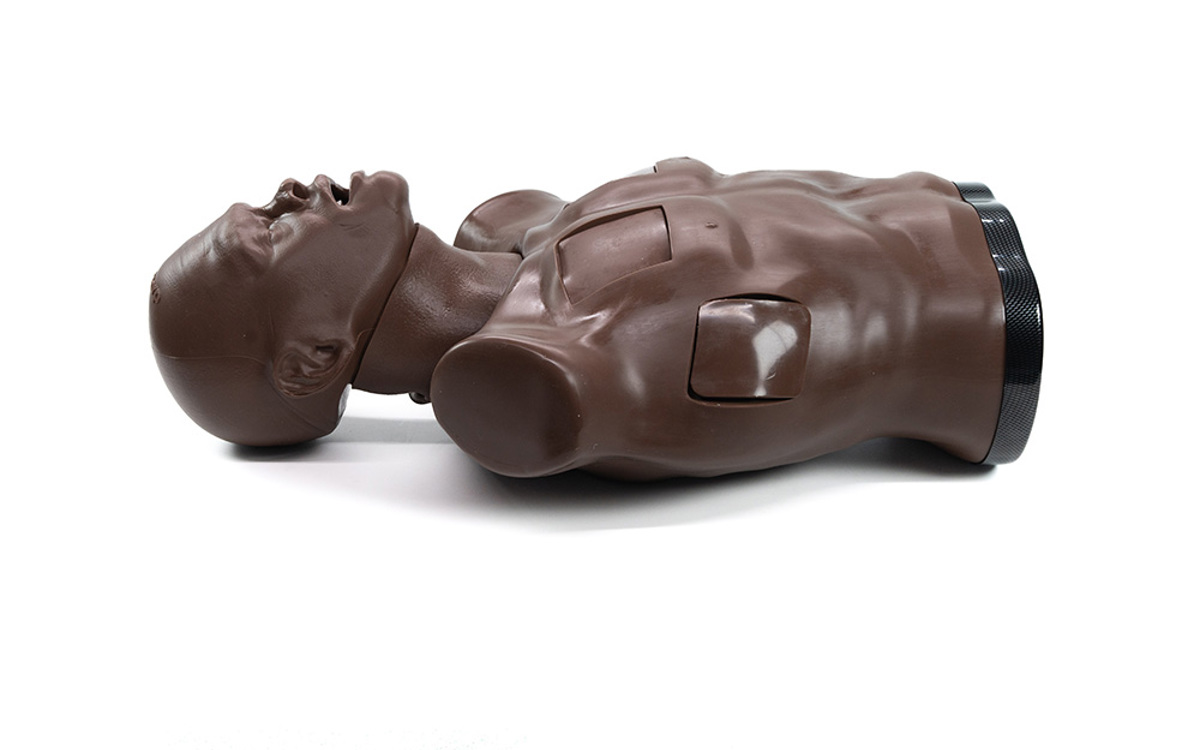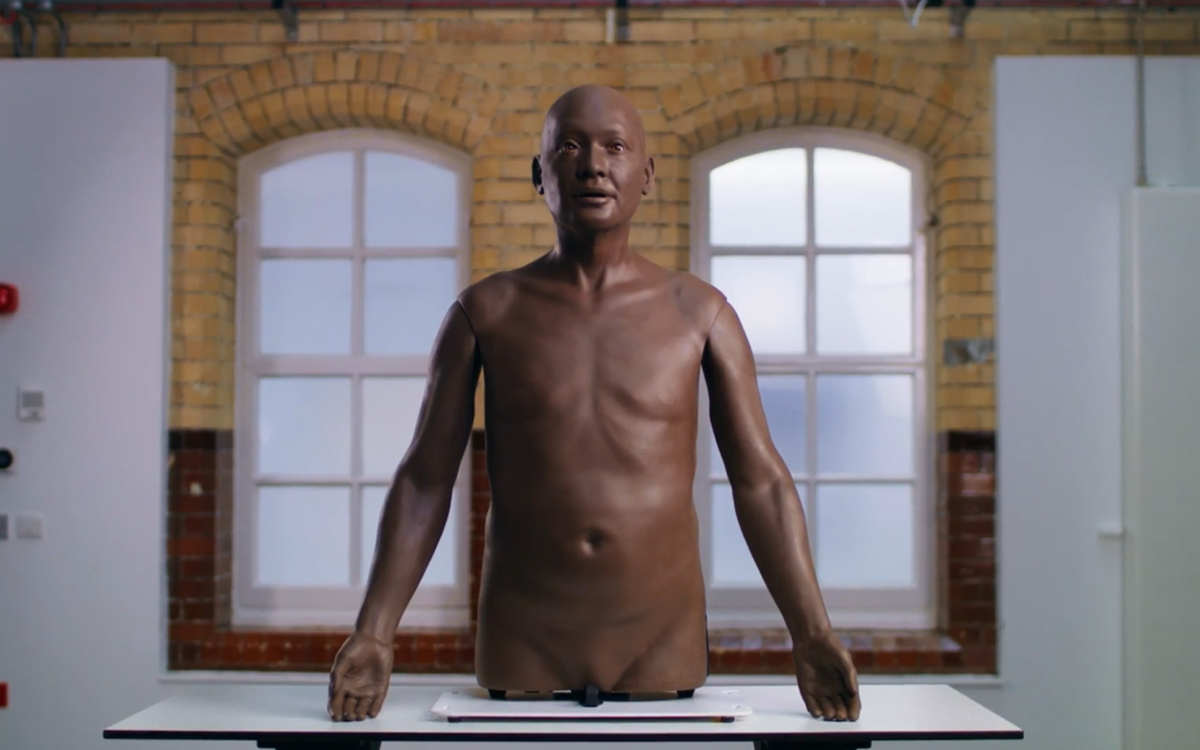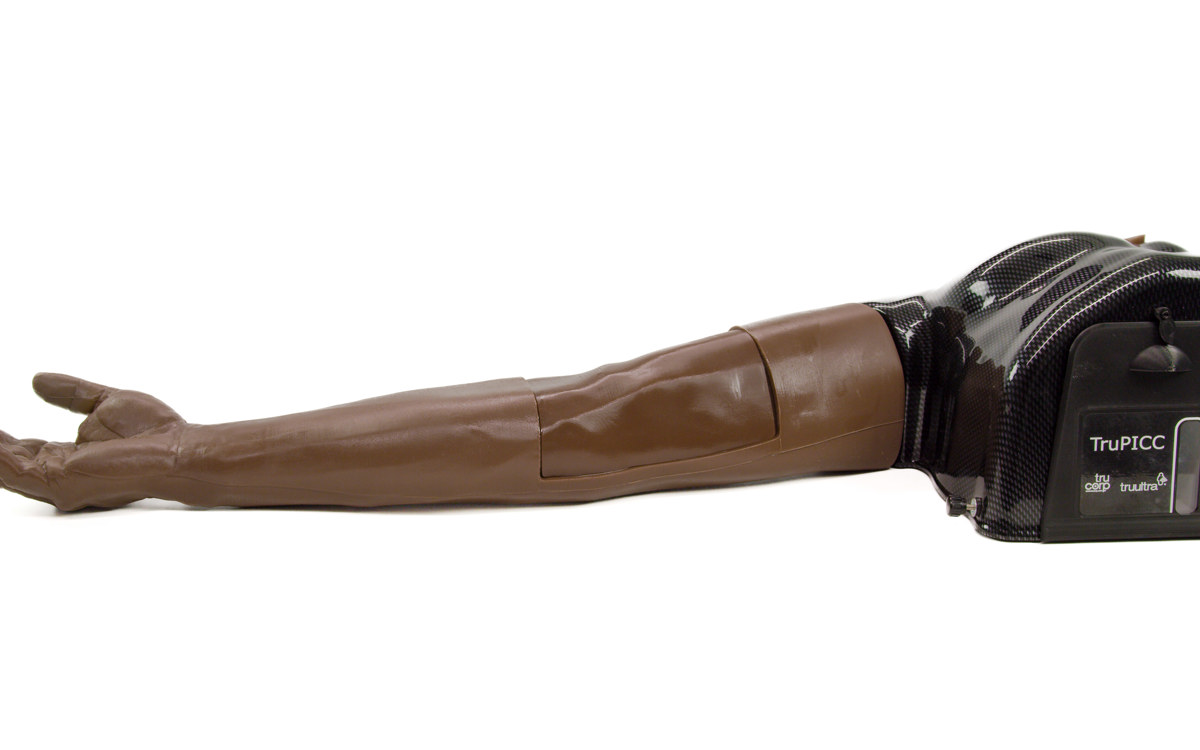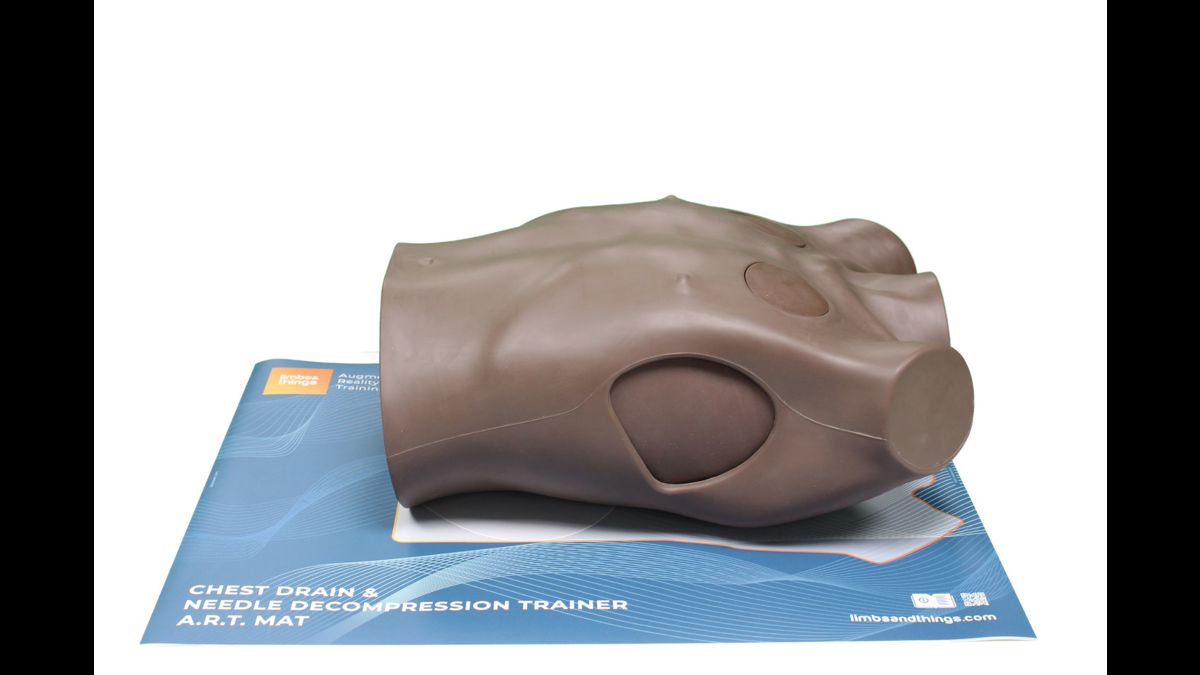
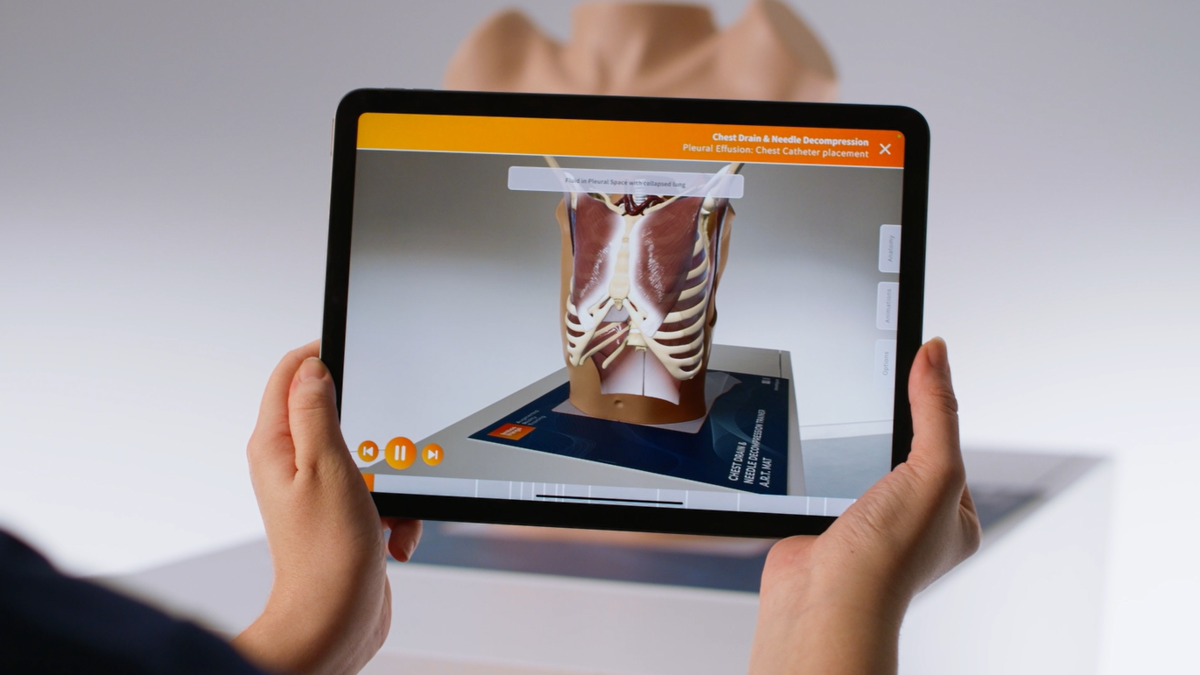
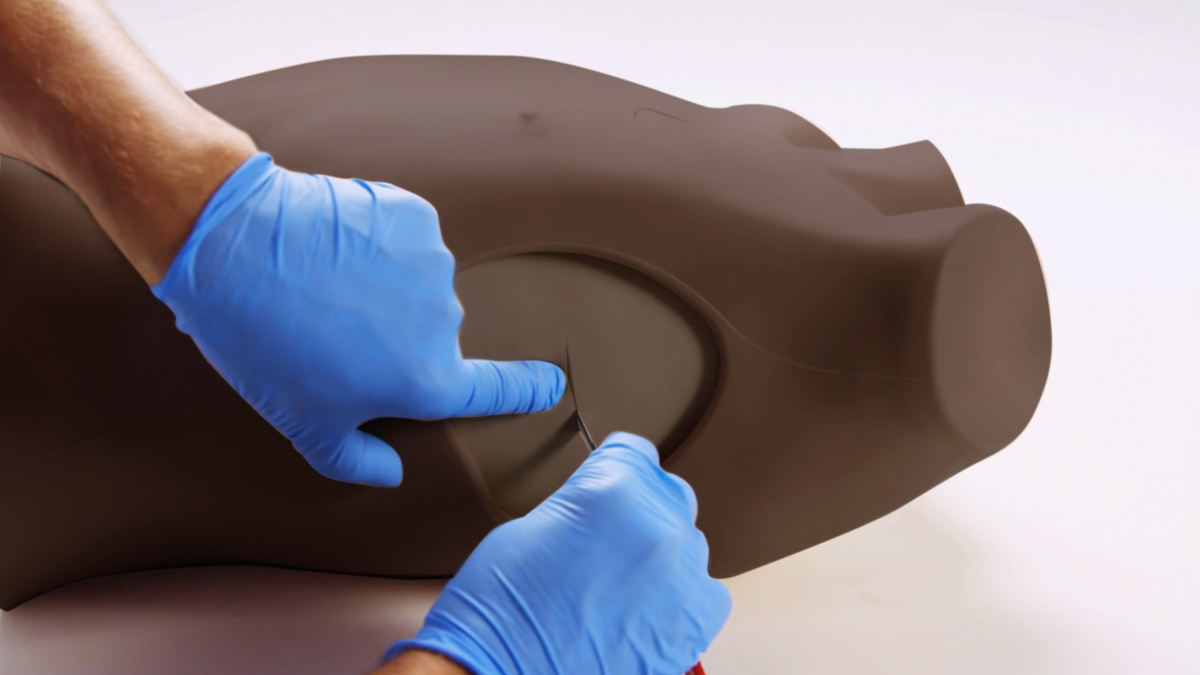
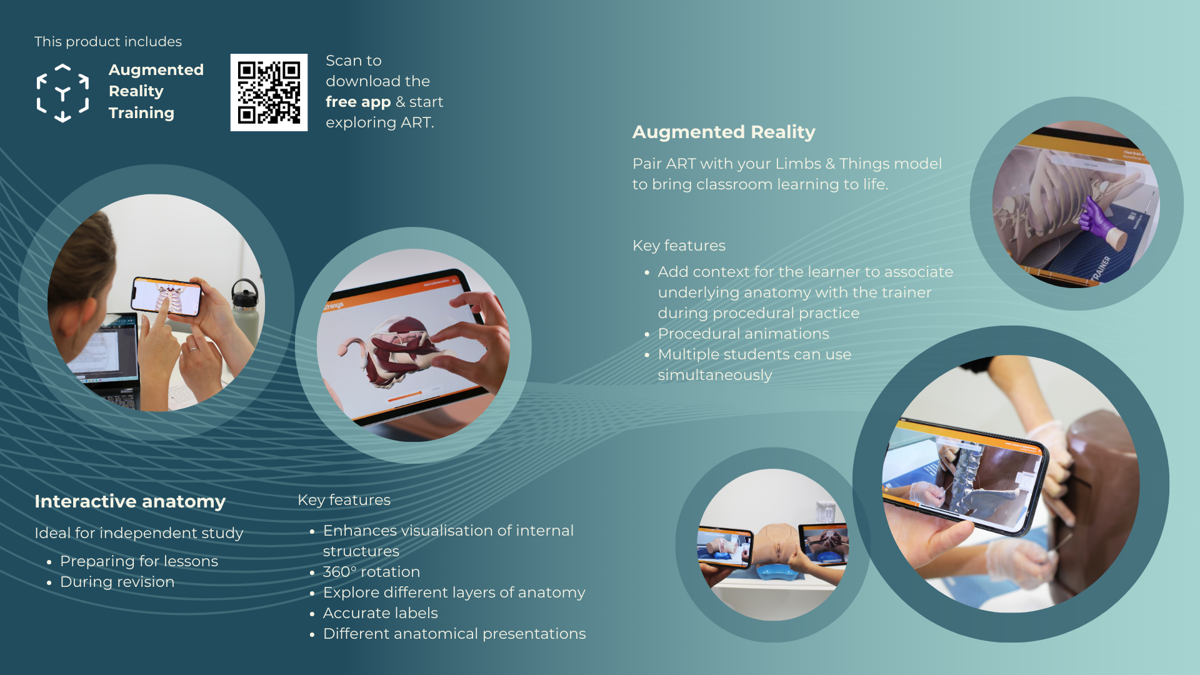
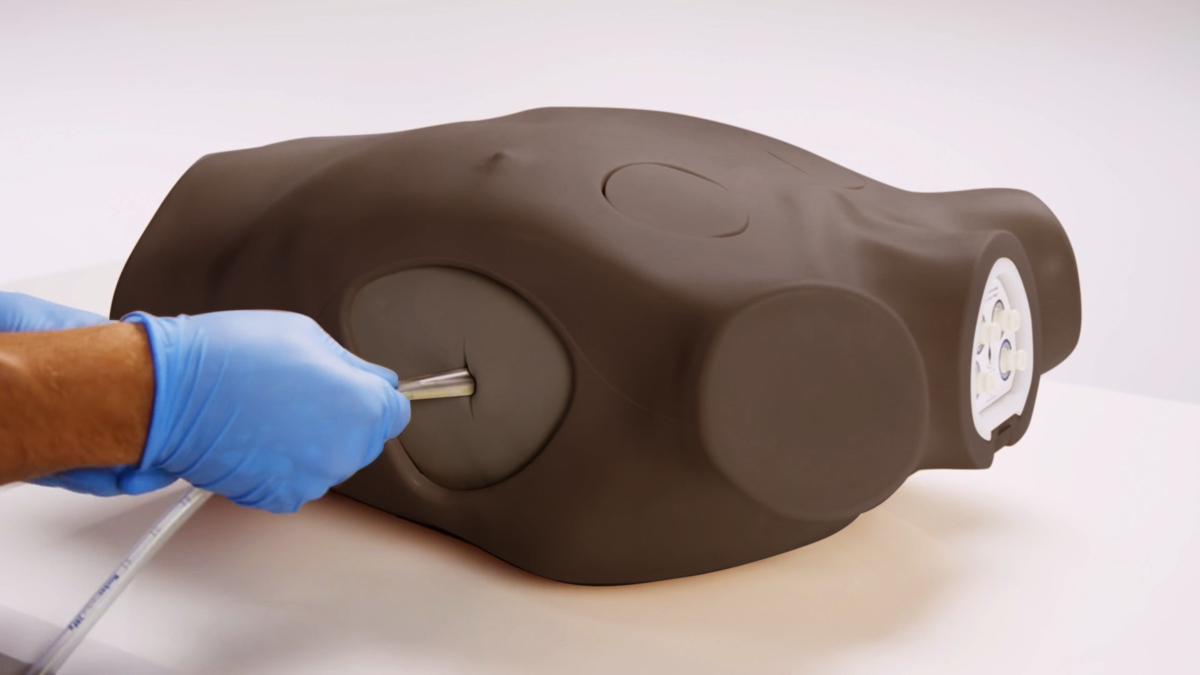
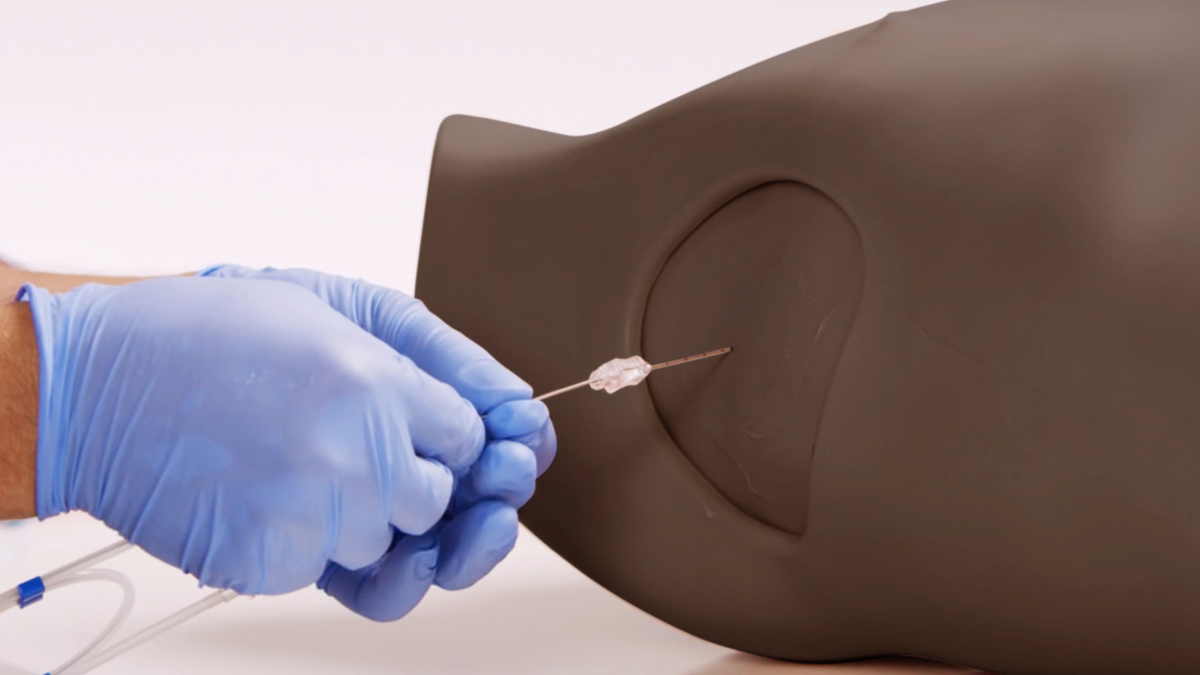
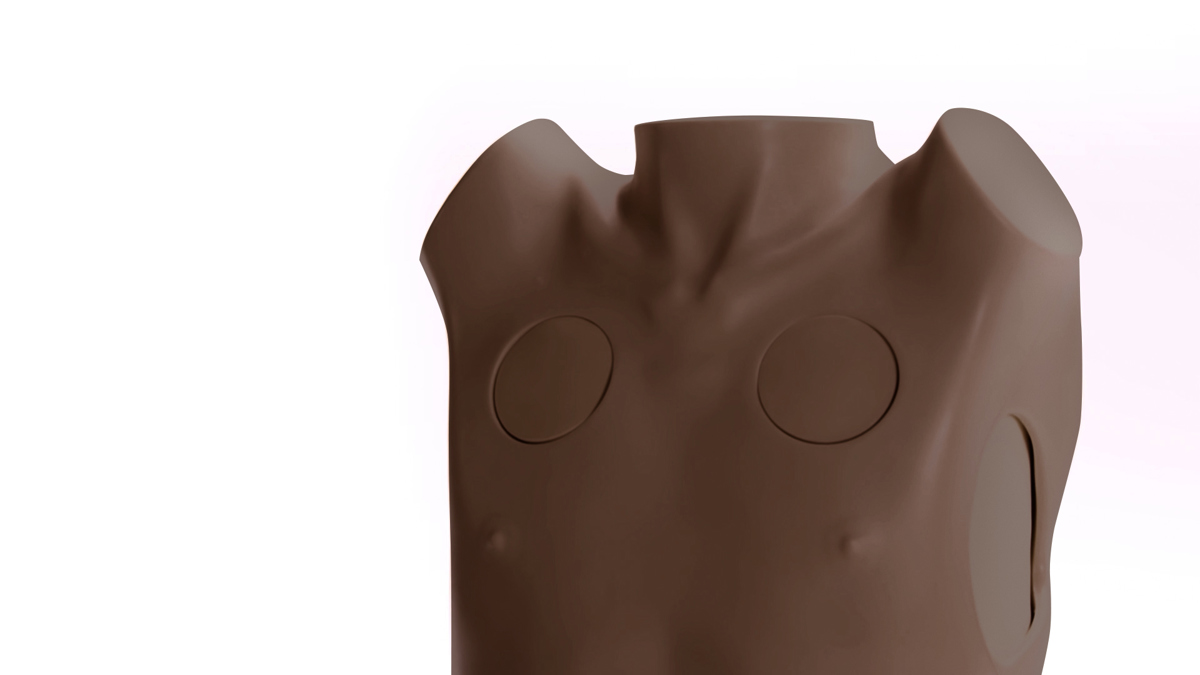
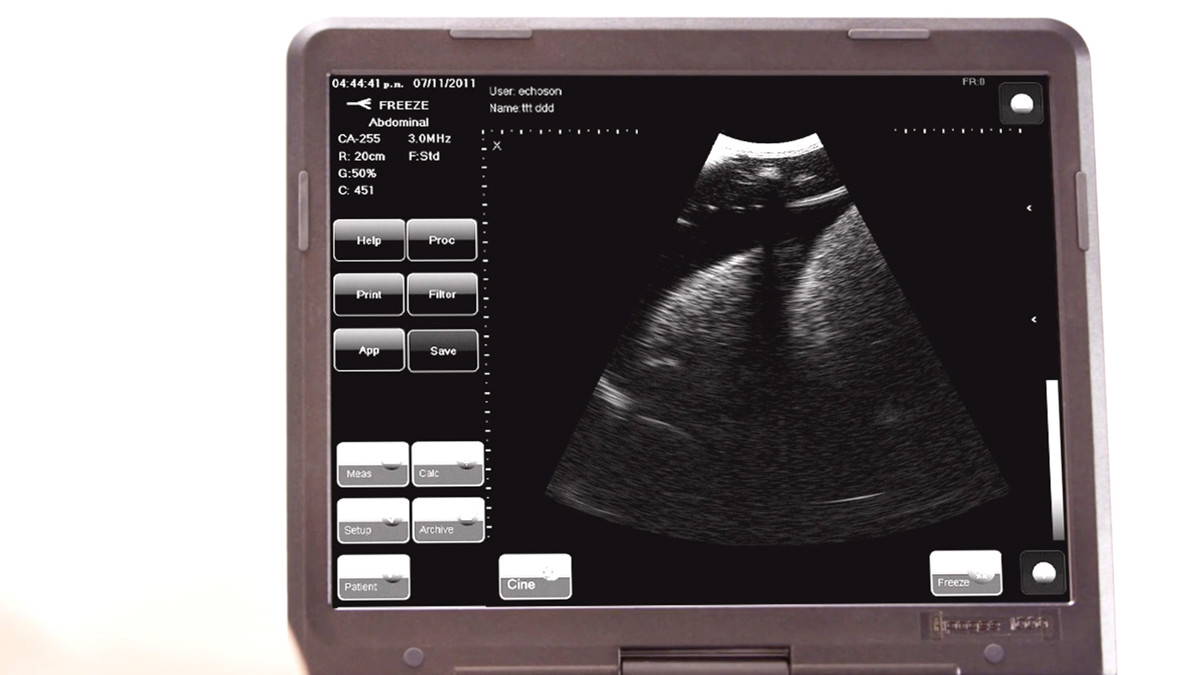
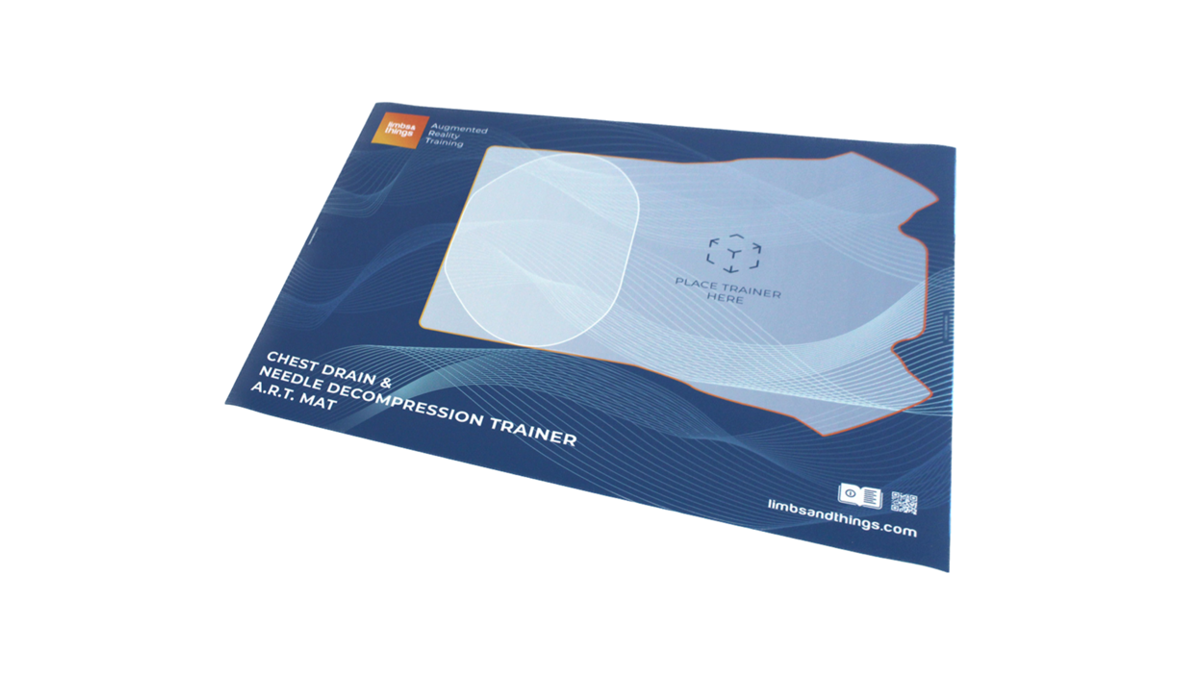
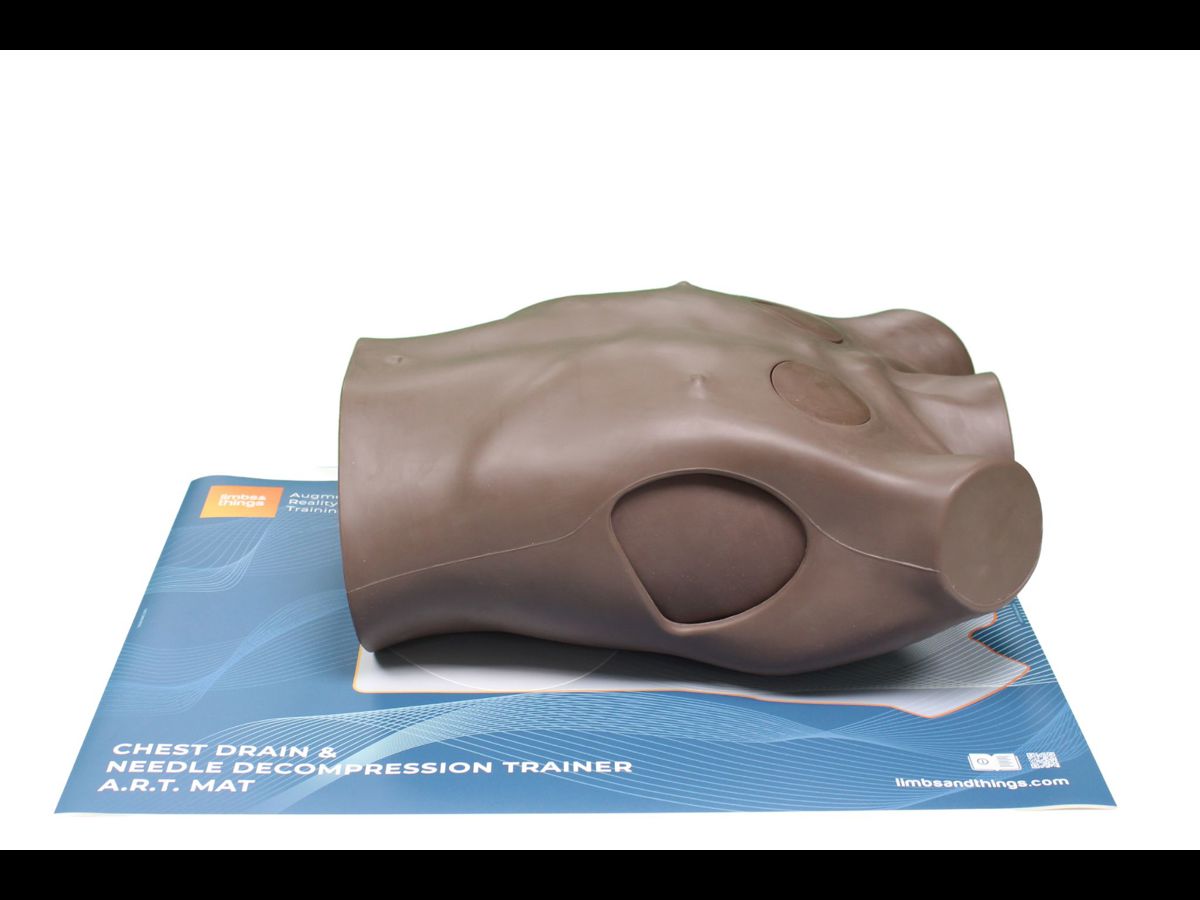
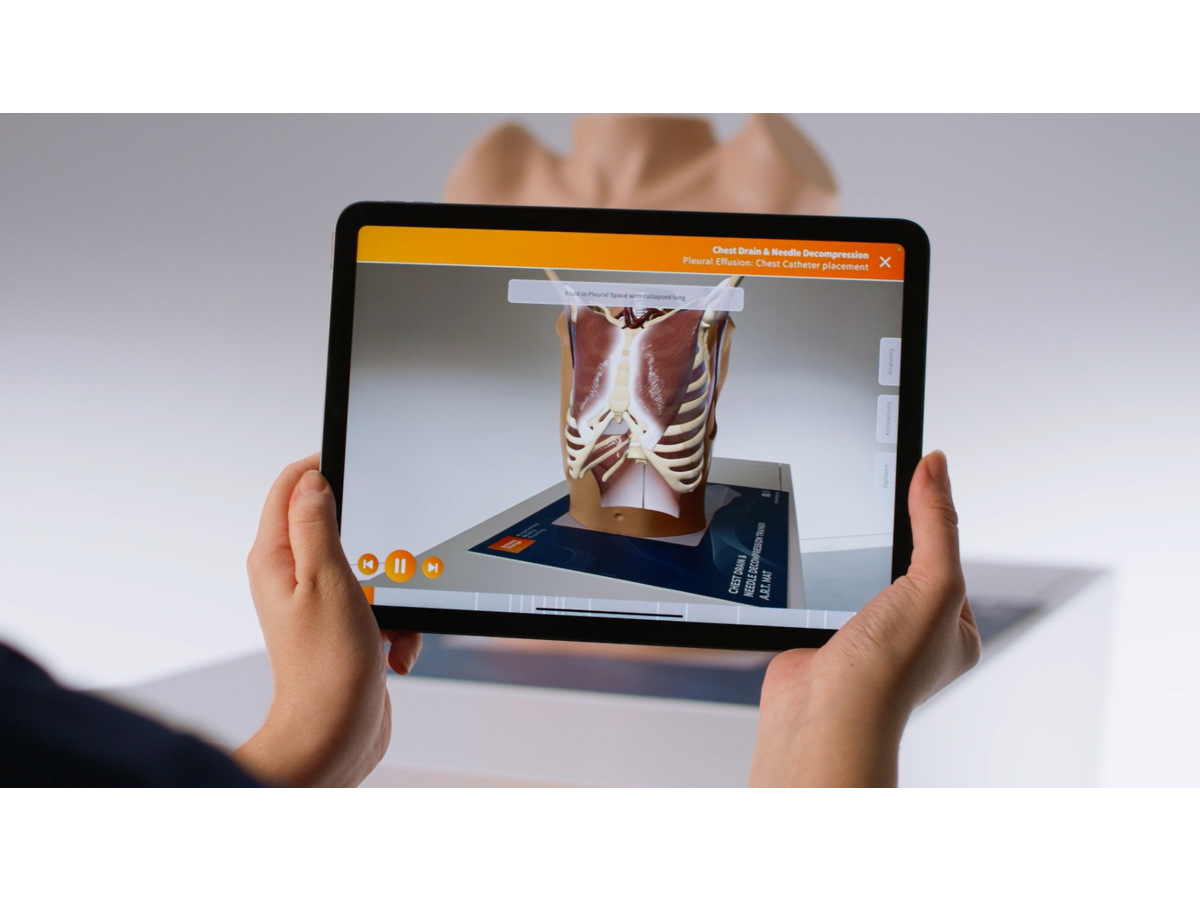

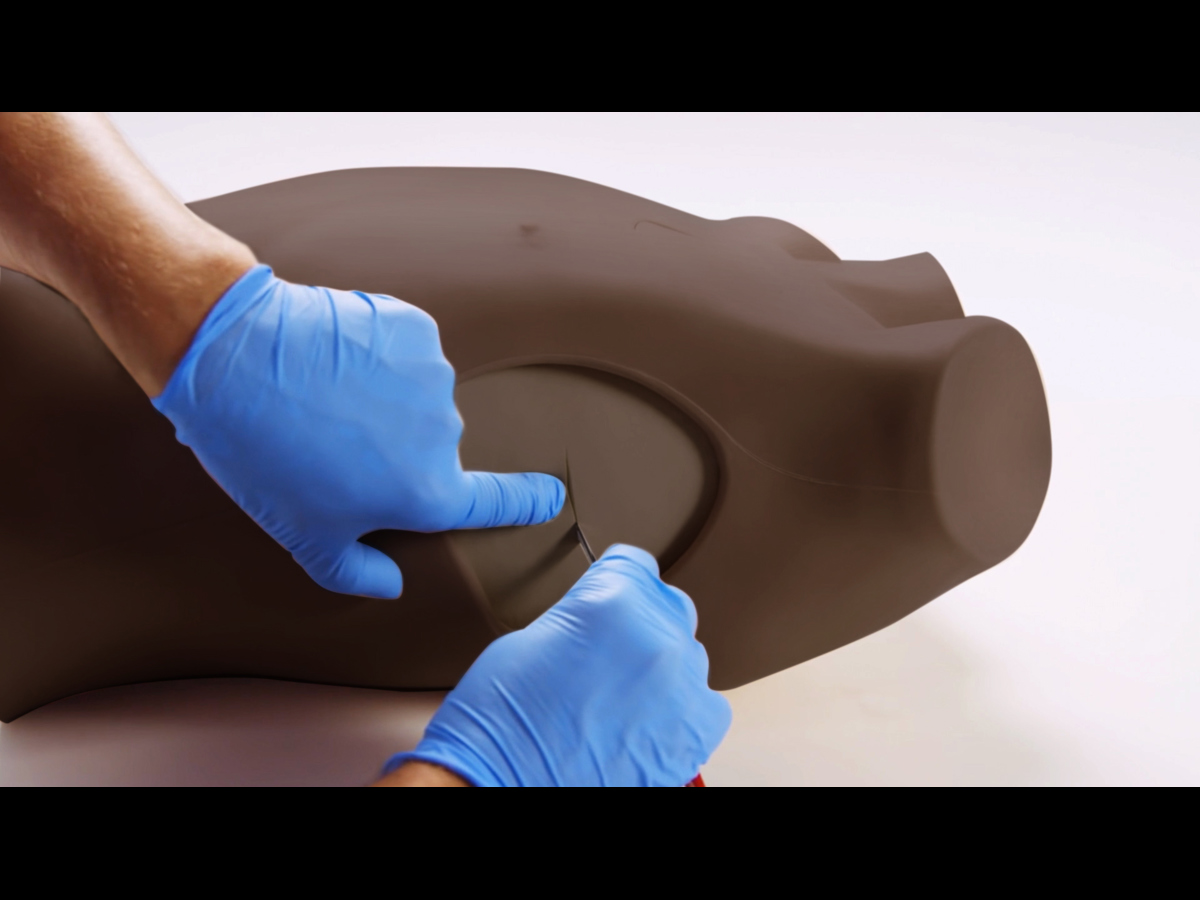
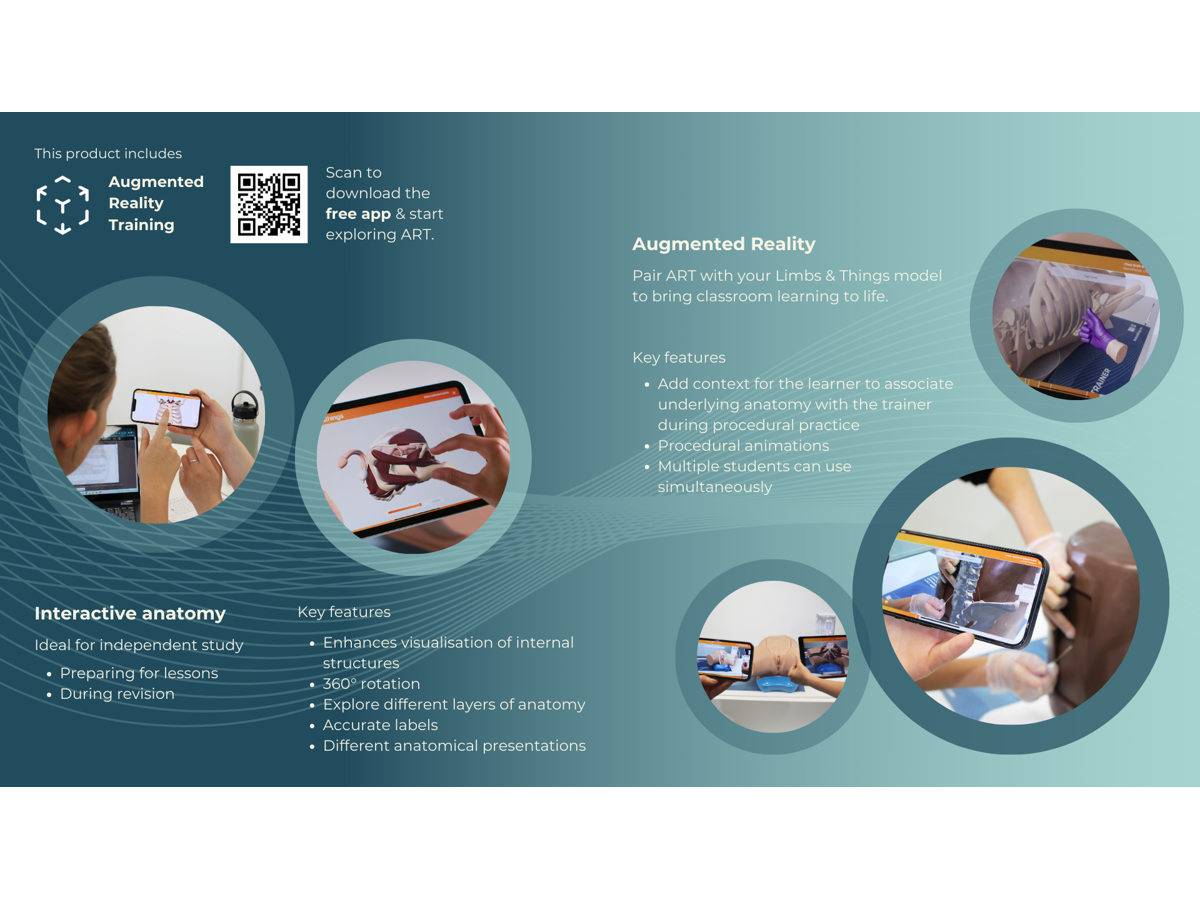
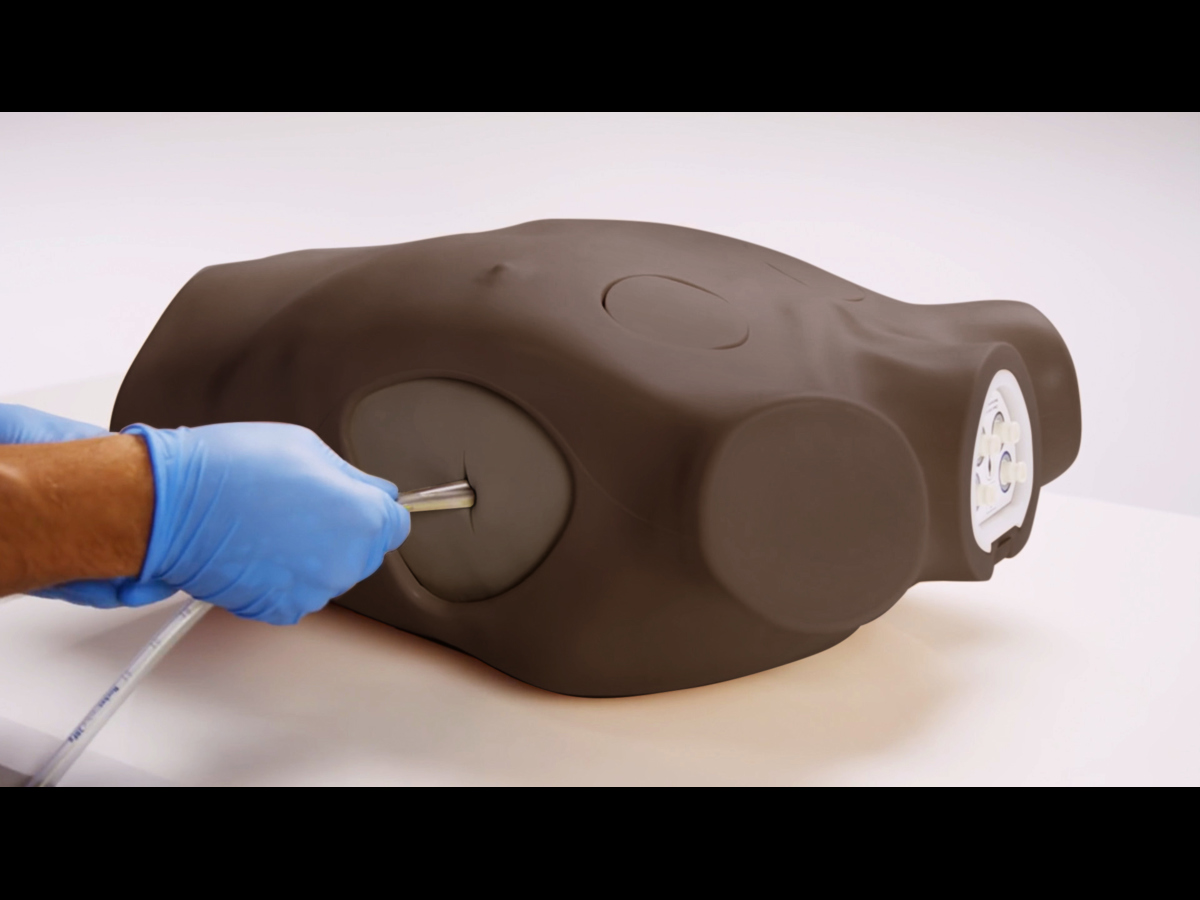
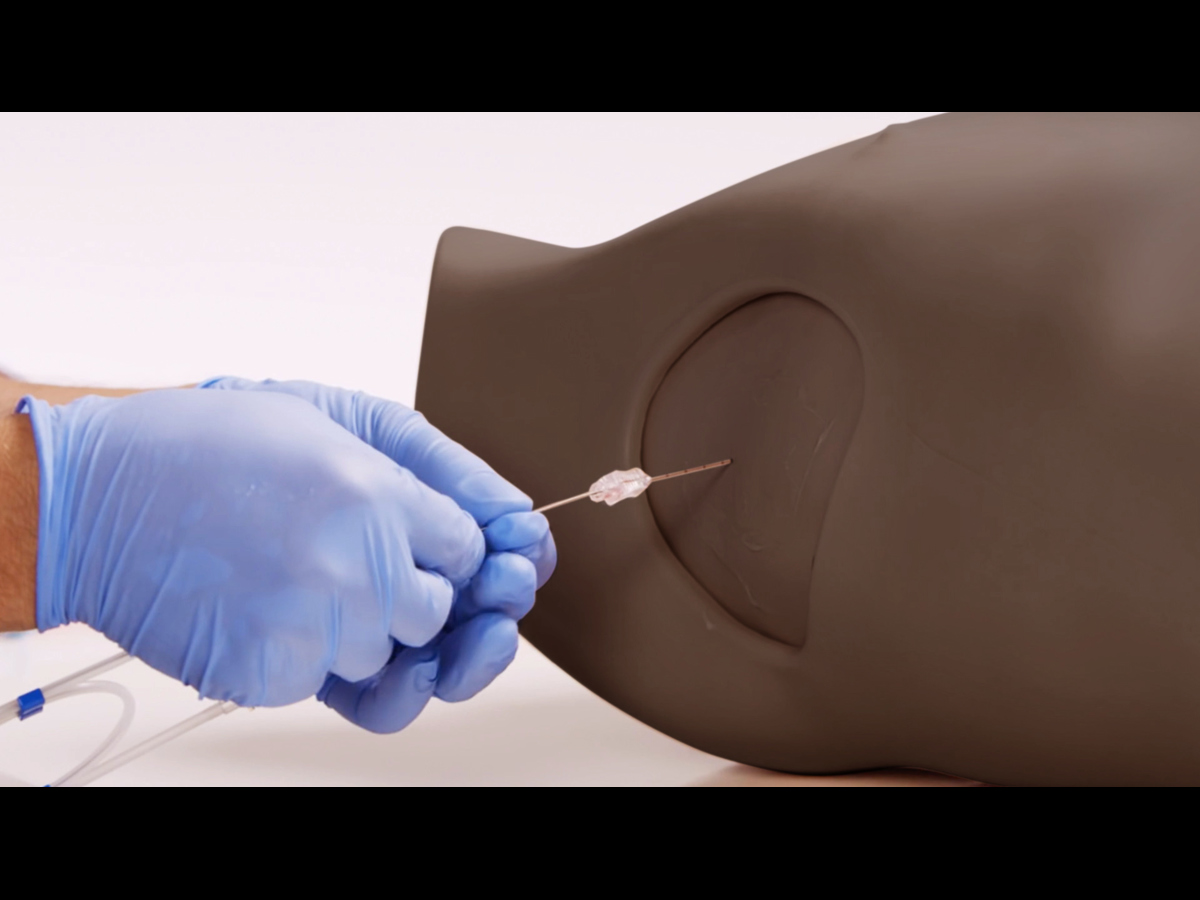
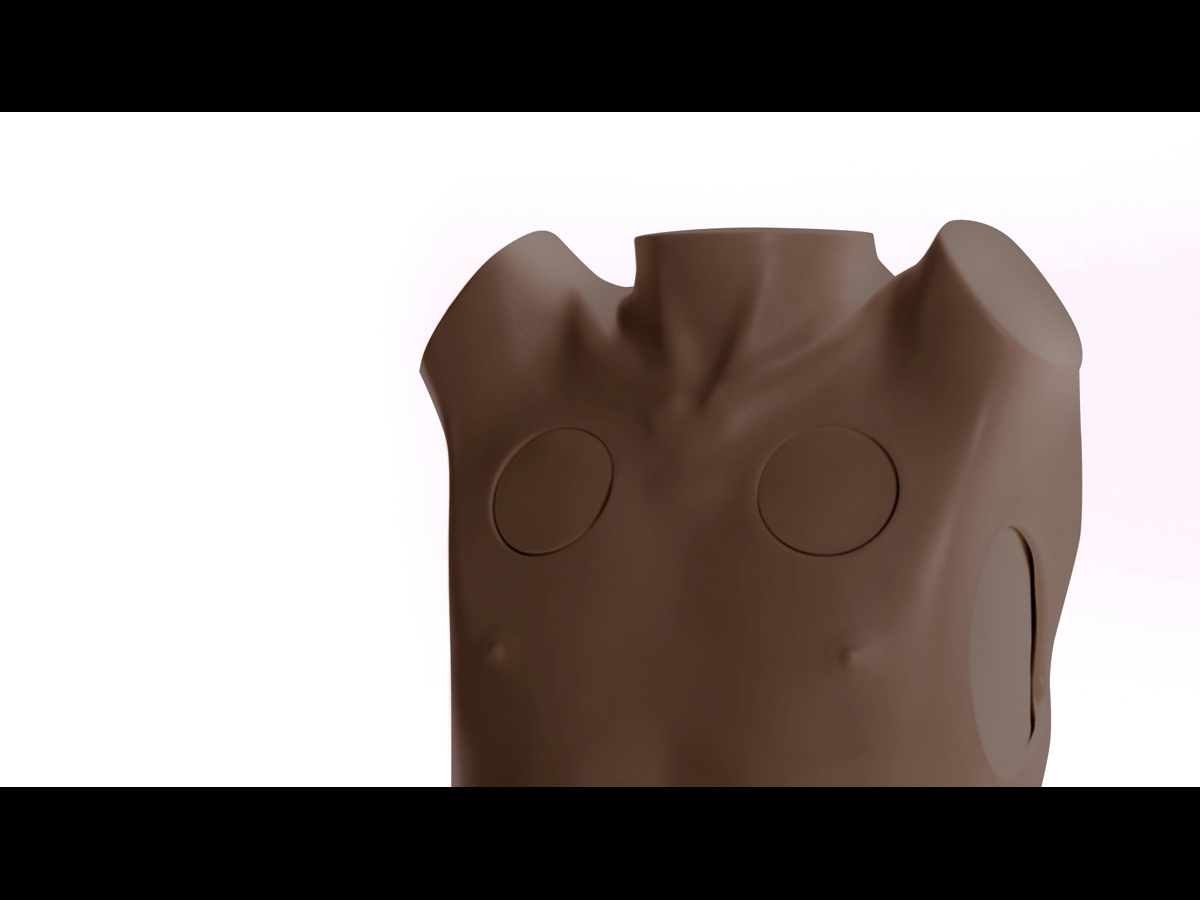
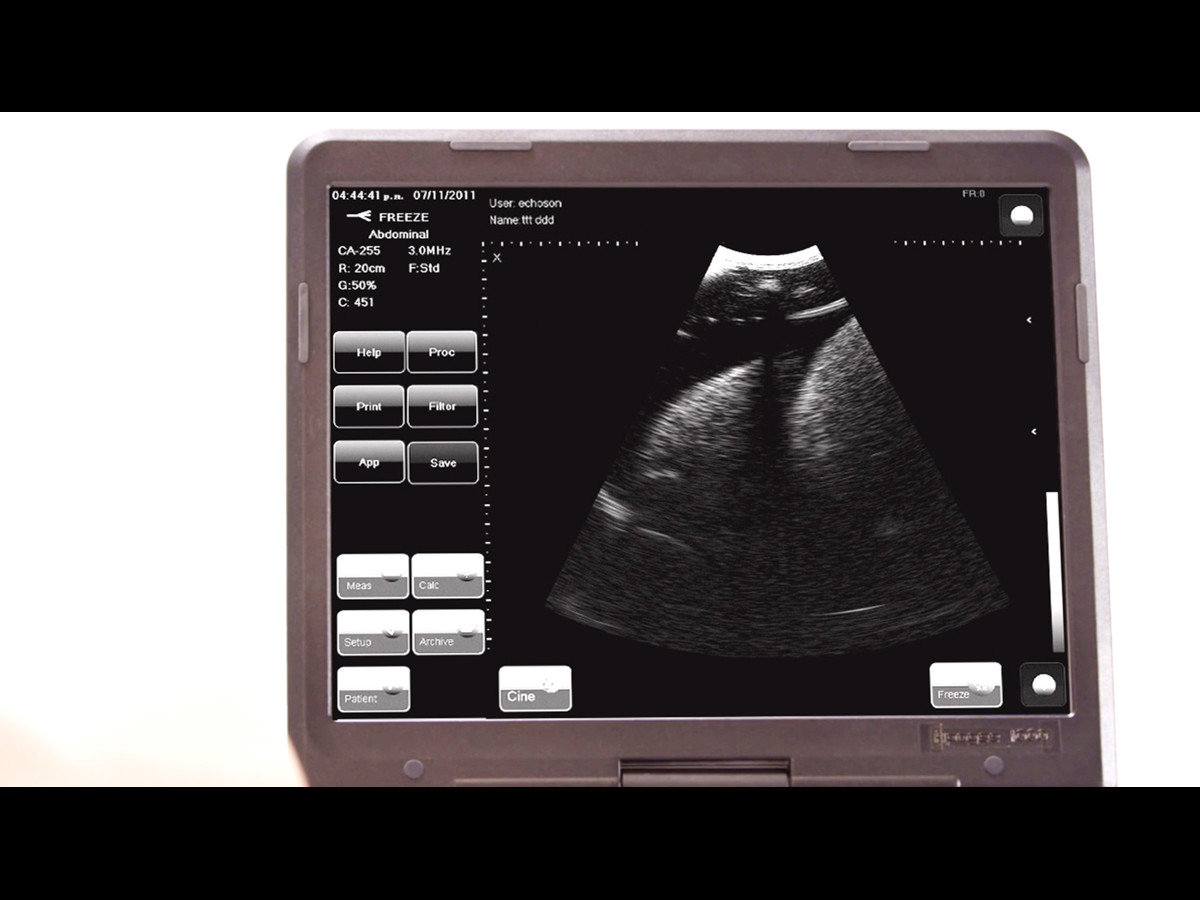
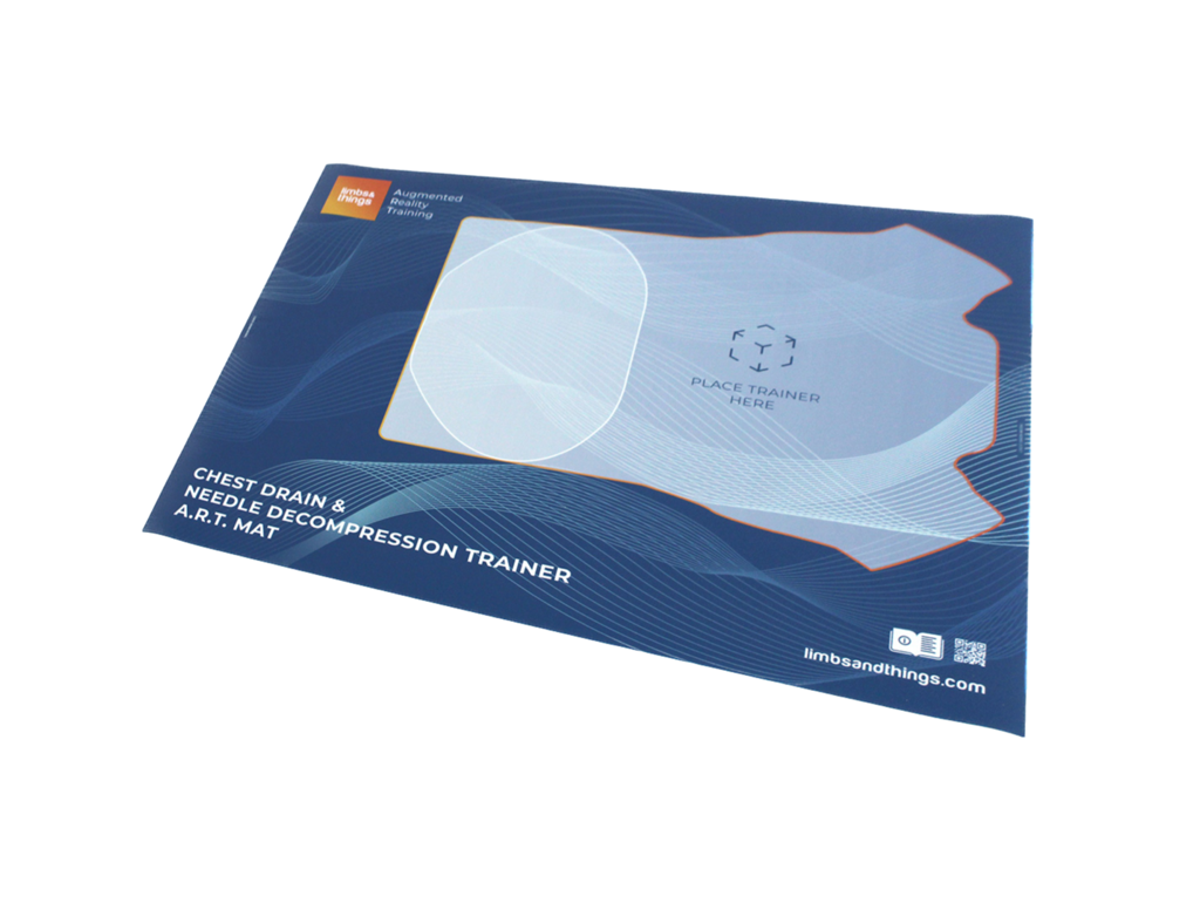
Chest Drain & Needle Decompression Trainer (Dark Skin Tone)
Skin Tone
Adding to cart...
Added to cart
Sorry, something went wrong adding the product to the cart.
Limbs & Things' Chest Drain & Needle Decompression Trainer has been designed to meet the specific requirements of healthcare professionals, this product is the ideal simulator to deliver training in both surgical and guidewire assisted thoracostomy and thoracentesis, chest drain and needle decompression techniques.
Chest tube insertion is possible on both types of pads, with the Advanced model’s echolucent material allowing practice of the Seldinger’s ultrasound technique.
A more realistic experience for trainees
Needle Decompression Pads
Located on the midclavicular lines, Needle Decompression Pads are used for the management of tension pneumothorax. Positive feedback of a realistic “hiss” of air releasing, or observable bubbles in a saline filled syringe upon successful decompression of the chest cavity.
Limbs & Things' Chest Drain & Needle Decompression Trainer has been designed to meet the specific requirements of healthcare professionals, this product is the ideal simulator to deliver training in both surgical and guidewire assisted thoracostomy and thoracentesis, chest drain and needle decompression techniques.
Chest tube insertion is possible on both types of pads, with the Advanced model’s echolucent material allowing practice of the Seldinger’s ultrasound technique.
A more realistic experience for trainees
Needle Decompression Pads
Located on the midclavicular lines, Needle Decompression Pads are used for the management of tension pneumothorax. Positive feedback of a realistic “hiss” of air releasing, or observable bubbles in a saline filled syringe upon successful decompression of the chest cavity.
Standard Pads
Two Standard Pads are included in this trainer. Each comes backed with a “pleural layer” that offers a realistic “pop” on insertion of finger or forceps into the pleural space. These foam pads are suitable for use with adhesive dressings, and sutures can be applied to secure the chest tube.
Advanced Pads
Suitable for use with mock fluids to simulate pleural effusions or haemothorax when using ultrasound guided techniques. With the supplied Respiratory Swing pump, it is possible to simulate movement within the chest cavity for increased realism under ultrasound.
Augmented Reality is now an integral part of Chest Drain training
The Augmented Reality Training Mats and App combine real world MRI and CT scan data, with the skills of talented medical artists and digital creators, to bring the internal anatomy of our trainers to life.
Within the FREE L&T ART app’s digital environment, you can move around your task trainer and view various overlays, including: the musculature, organs and vessels, and skeletal structure. The interface allows you to move seamlessly between the layers, as well as view their cross sections.
Students are also able to view digital procedures in the AR environment to see how the procedure is done, and its impact on the patient’s anatomy.
Overview
- FREE Augmented Reality Training app and mat compatible with this Chest Drain trainer
- Approved for use in ATLS courses
- Supports realistic insertion of needles, guidewires, dilators and drain tubes
Realism
- Anatomically accurate torso, representative of an adult male
- Needle decompression sites give positive feedback following correct technique (hiss of air on needle insertion)
- Needle decompression possible at the 2nd, 4th and 5th intercostal spaces
- Suitable for use with mock fluids as well as water
- Air bulbs replicate breathing under ultrasound (Advanced Pads only)
- Standard Pads have a pleural layer with realistic give, and “pop” when punctured with forceps or finger
Versatility
- Standard & Advanced Pads allow support multiple techniques, including, skin incision, suturing, and ultrasound (Seldinger technique)
- Chest drain simulator can be used in the sitting or supine position
Cleaning
- Drain fluids from trainer after use
- Rinse with clean water after use of simulated fluids
- Clean skin with a damp soft cloth, warm water and mild detergent
- Allow product to completely dry before storing, inside of water chambers can be dried with a soft damn cloth
Safety
- All components are latex free
- Use caution when moving product, packed weight ~16kg
- Due to the increased weight and movement of the fluid when the chambers are filled, we would advise filling/emptying the simulator in place with a jug or having two people move it into position. Filled weight can be up to ~21kg
- Fluid use is only possible with the Advanced Pads
- Ensure the securing knobs around the pads are properly sealed to avoid fluid leakage
Anatomy
- Adult male upper torso
- Arms in raises position
- Represented internal anatomy landmarks: ribs, lungs and diaphragm
Skills Gained
- Needle decompression (or needle thoracostomy) of a tension pneumothorax, at 4th , 5th and 2nd intercostal spaces
- Recognition of underlying chest structures under ultrasound
- Ultrasound guided chest tube insertion (Seldinger technique)
- Needle insertion into the pleural space
- Open or cut-down chest tube insertion
- Chest tube positions
- Surgical incision and blunt dissection through the chest wall
- Correct technique to perforate the pleura
- Finger sweep assessment
- Suturing of the tube to the chest wall
- Management of pleural effusion
- Use of a chest drain to remove fluid from the chest cavity (using an underwater seal)
Product Contains
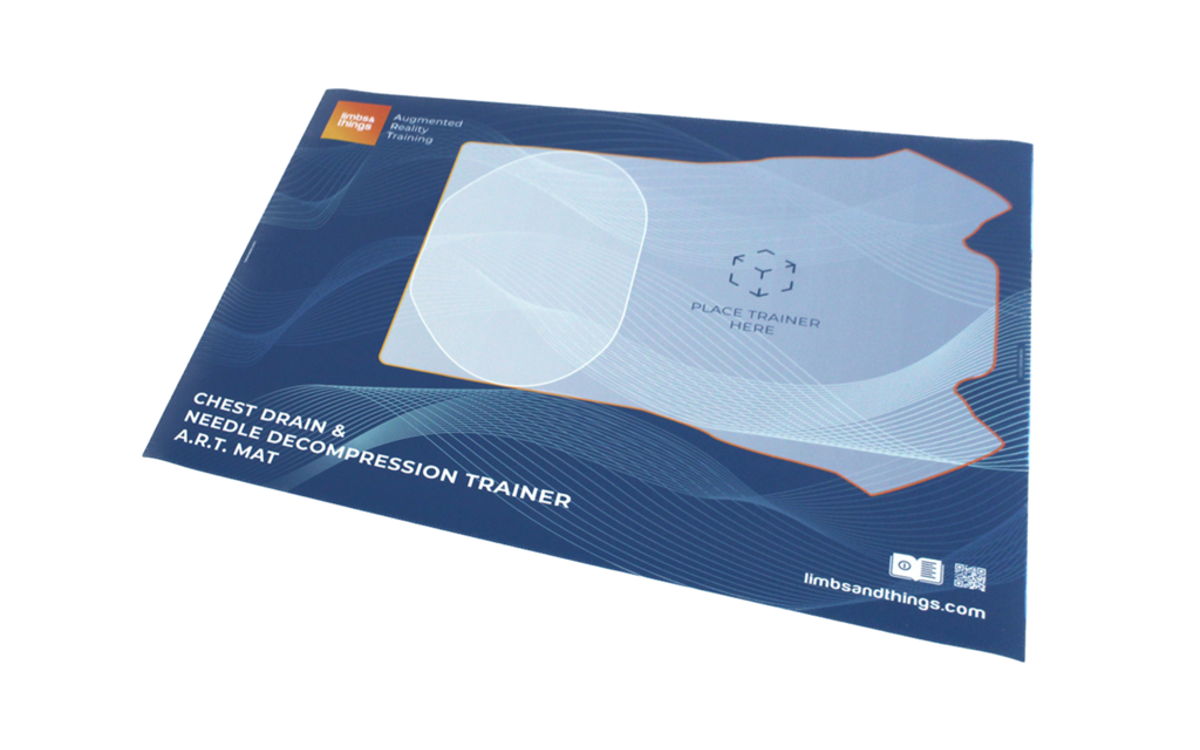
ART Mat for Chest
-
Light
-
Dark
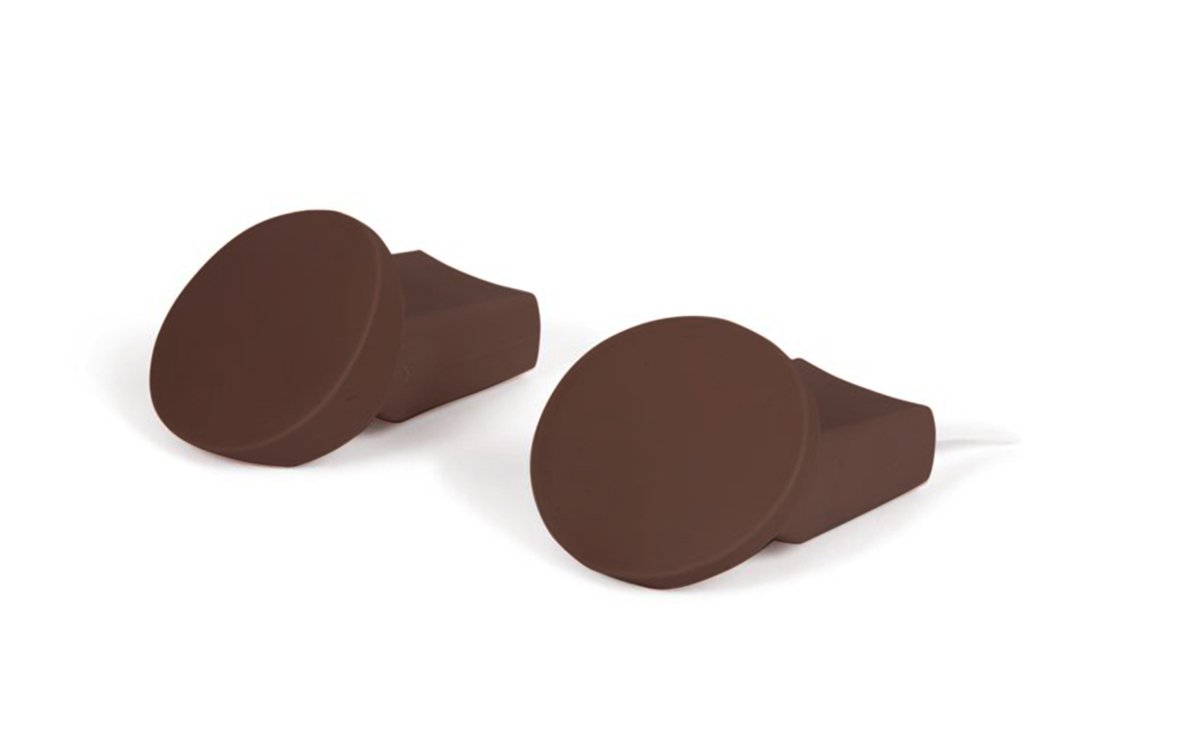
Needle Decompression Pads (Pack of 2, Dark Skin Tone)
-
Light
-
Dark
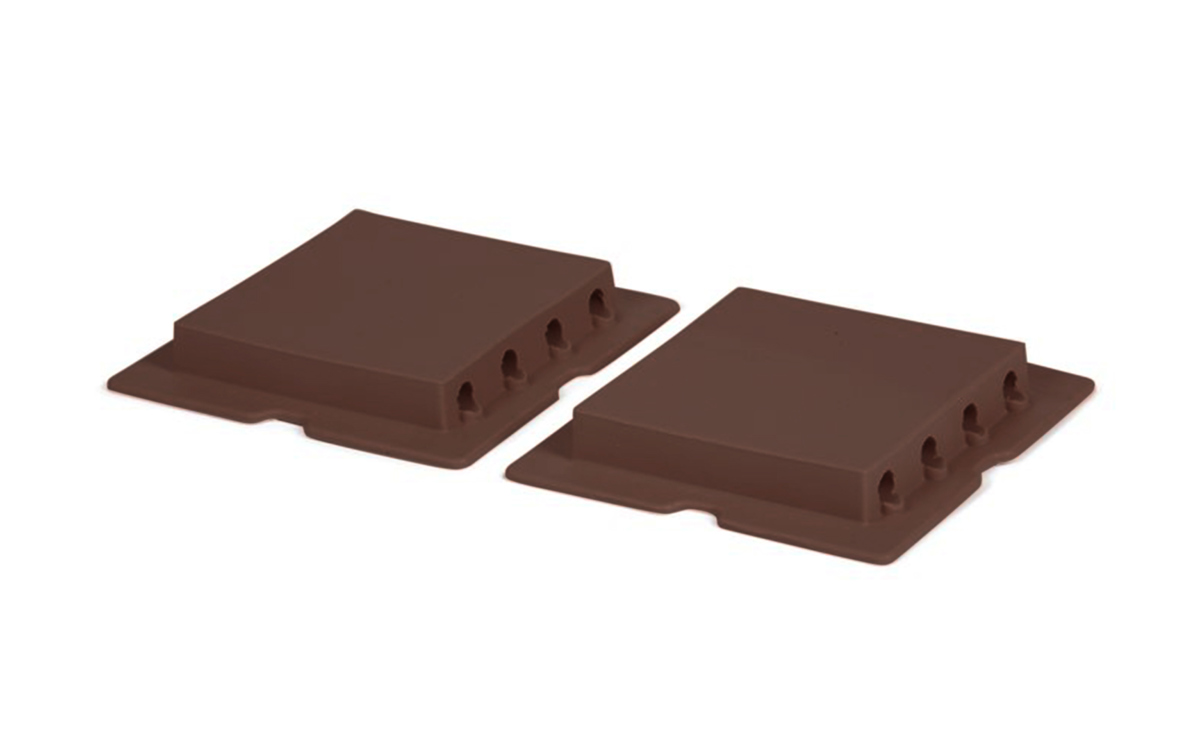
Advanced Chest Drain Pads (Pack of 2, Dark Skin Tone)
-
Light
-
Dark
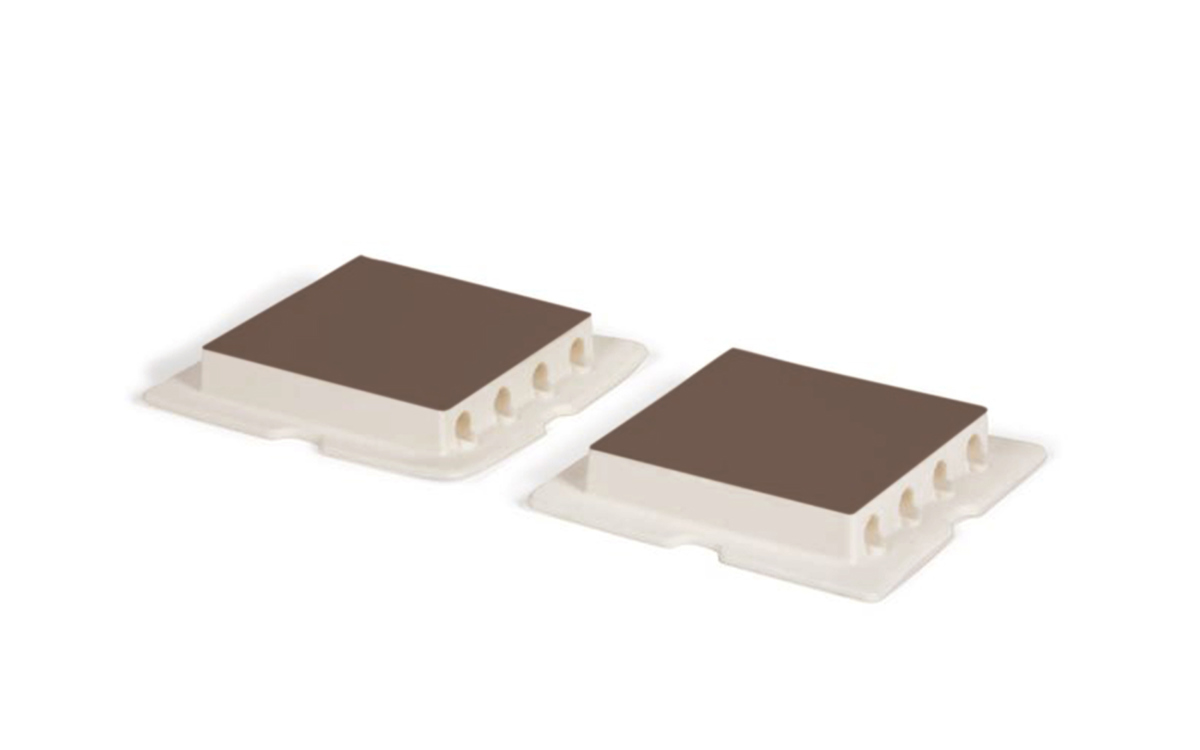
Standard Chest Drain Pads (Pack of 2, Dark Skin Tone)
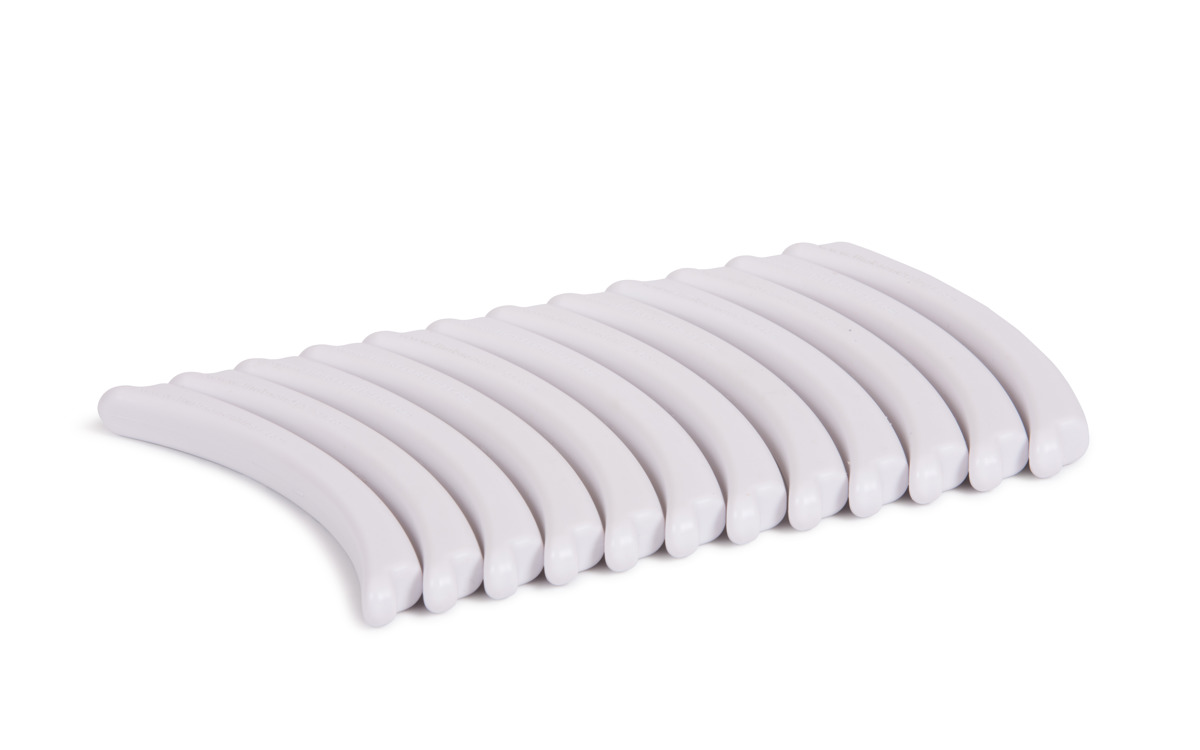
Chest Drain Ribs (Pack of 12)
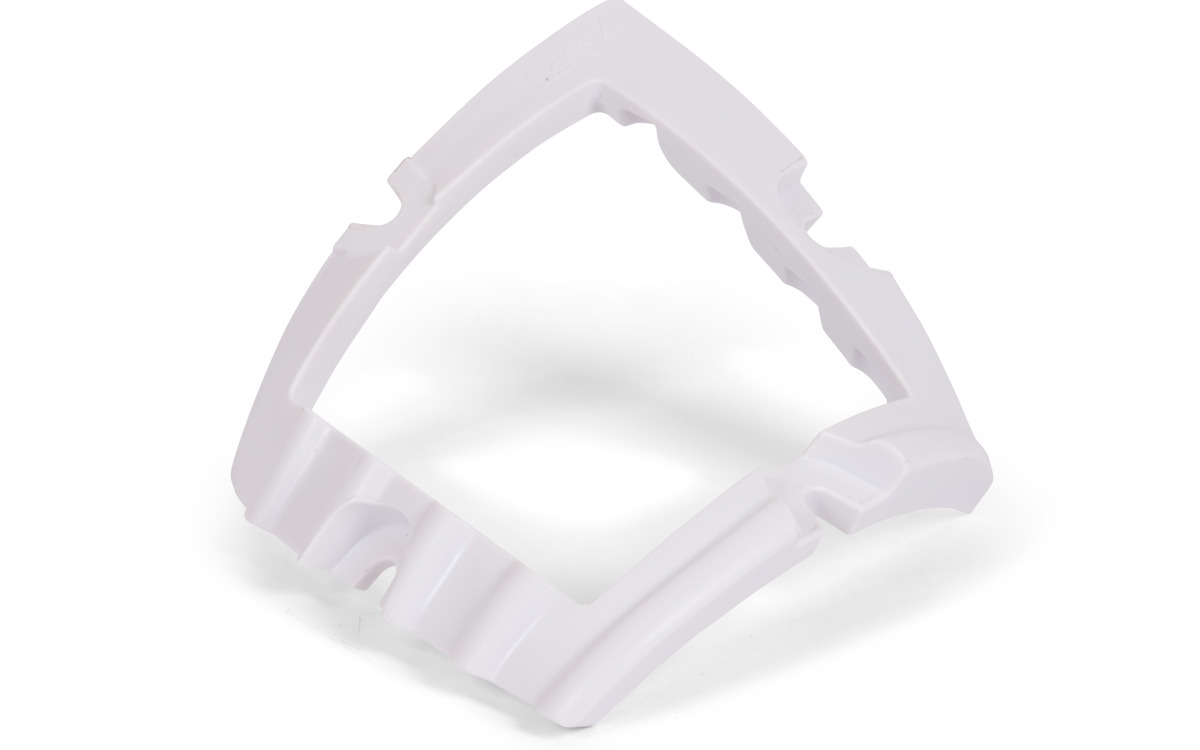
Chest Drain Rib Frame (Left)
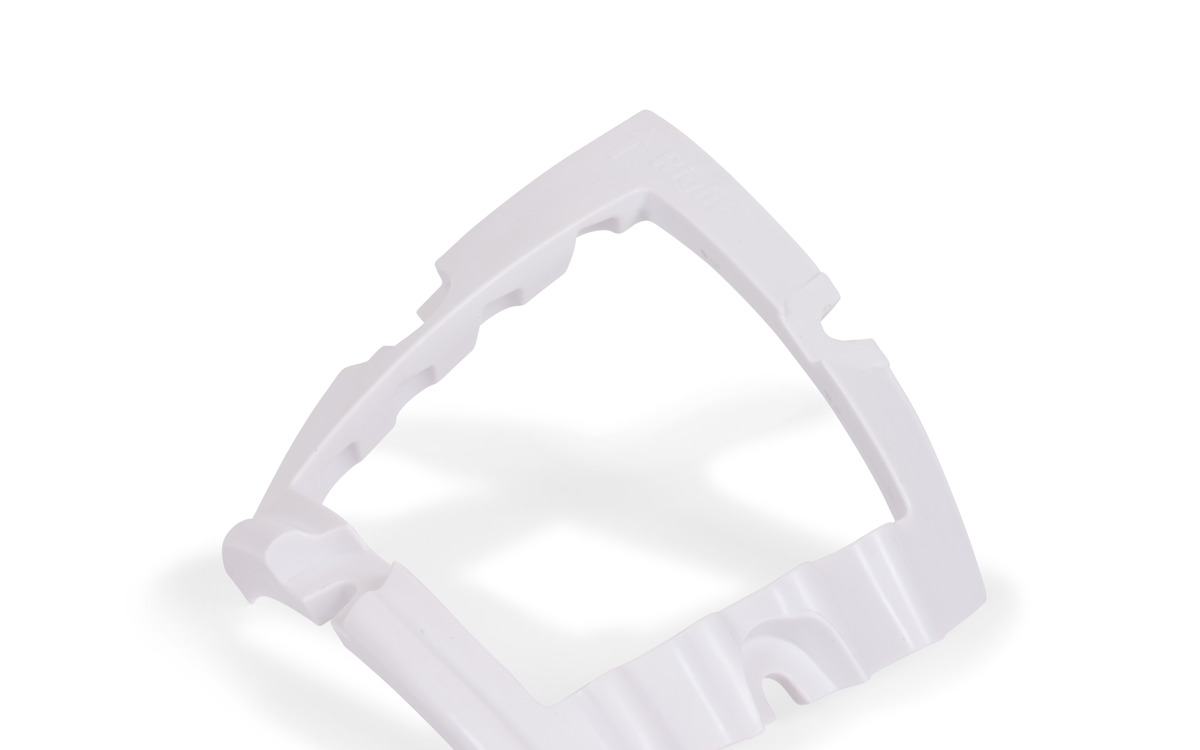
Chest Drain Rib Frame (Right)
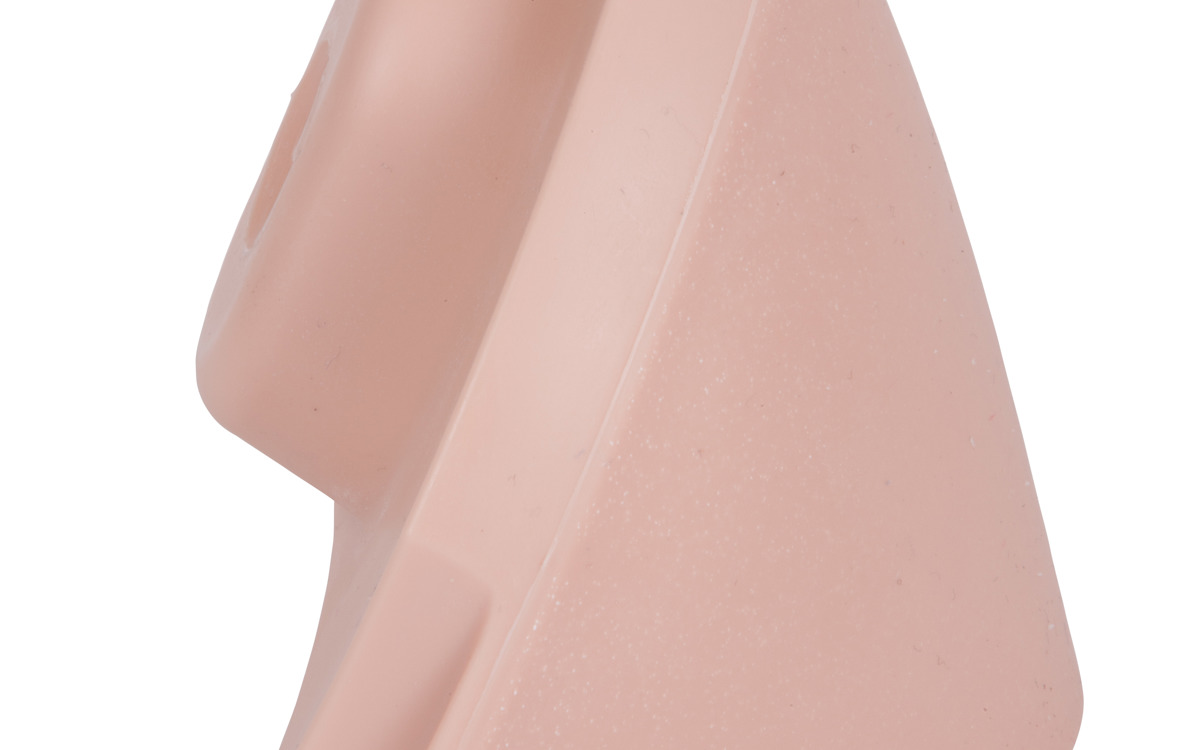
Chest Drain Lung
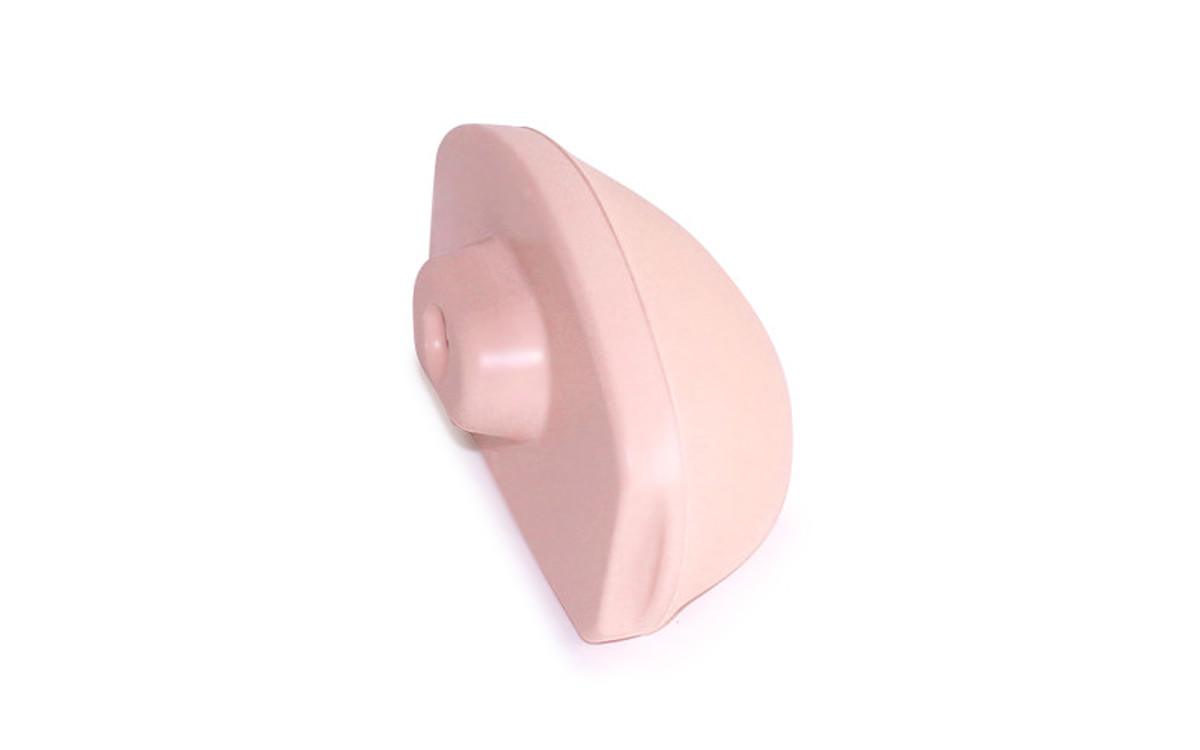
Chest Drain Diaphragm
-
Light
-
Dark
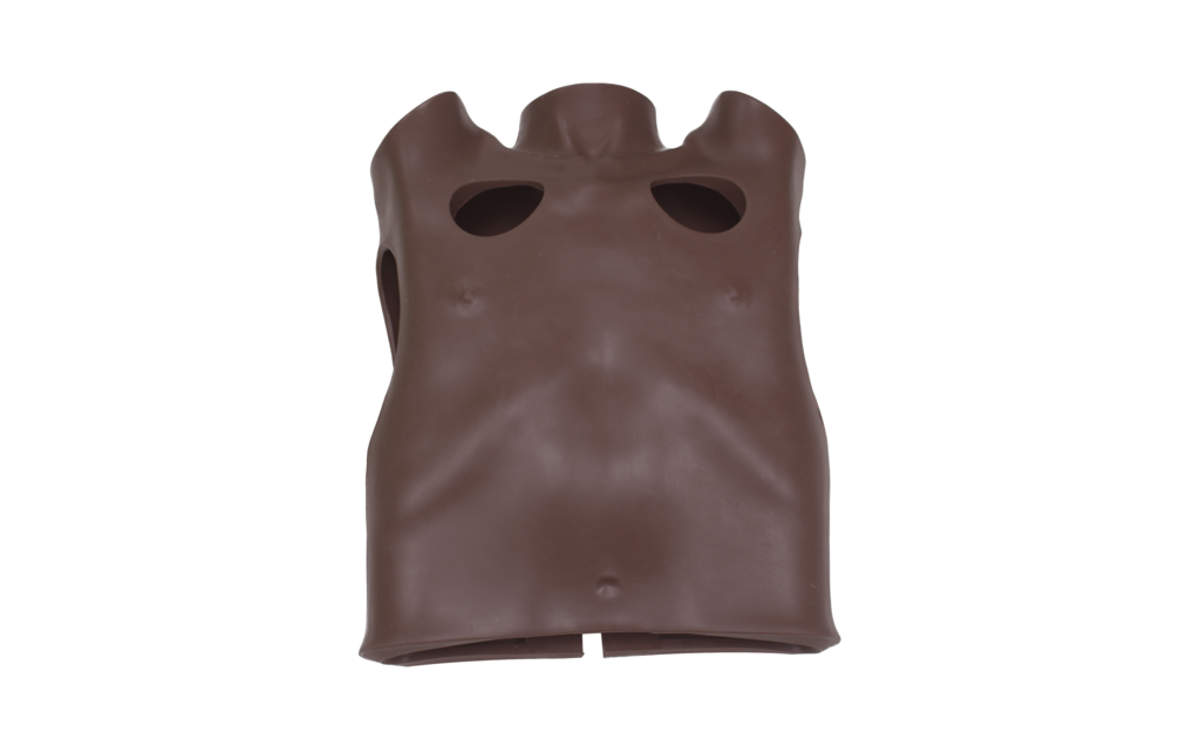
Chest Drain Skin (Dark Skin Tone)
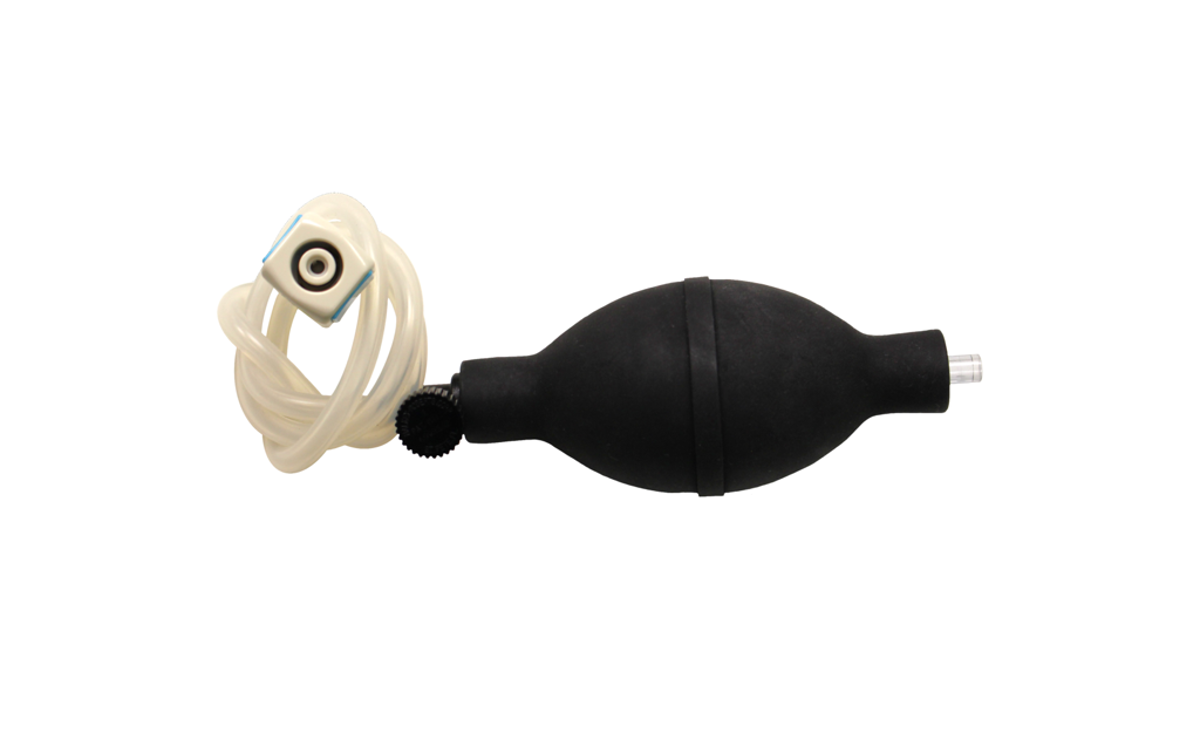
Chest Drain Pump: Needle Decompression
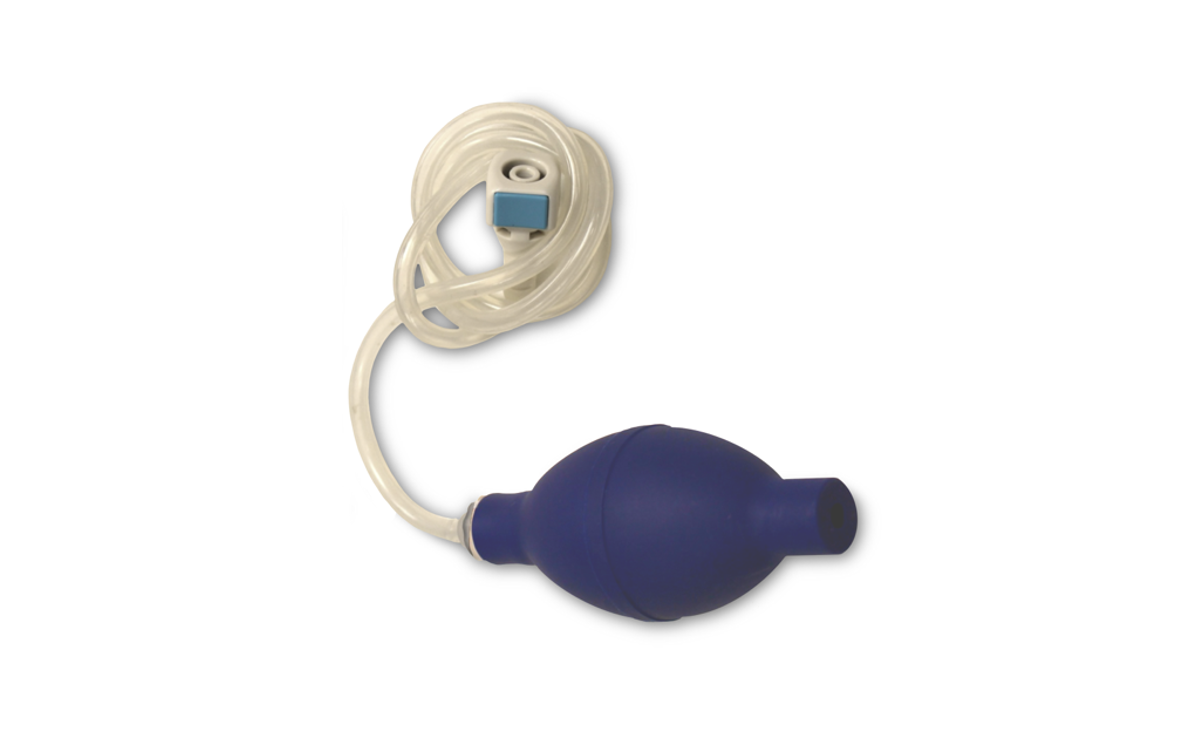
Chest Drain Pump: Respiratory Swing
Also contains, 12 piece Slotted Retaining Knobs set with tightening key.
Works with the following products:

ART Mat for Chest
-
Light
-
Dark

Needle Decompression Pads (Pack of 2, Dark Skin Tone)
-
Light
-
Dark

Advanced Chest Drain Pads (Pack of 2, Dark Skin Tone)
-
Light
-
Dark

Standard Chest Drain Pads (Pack of 2, Dark Skin Tone)
-
Light
-
Dark
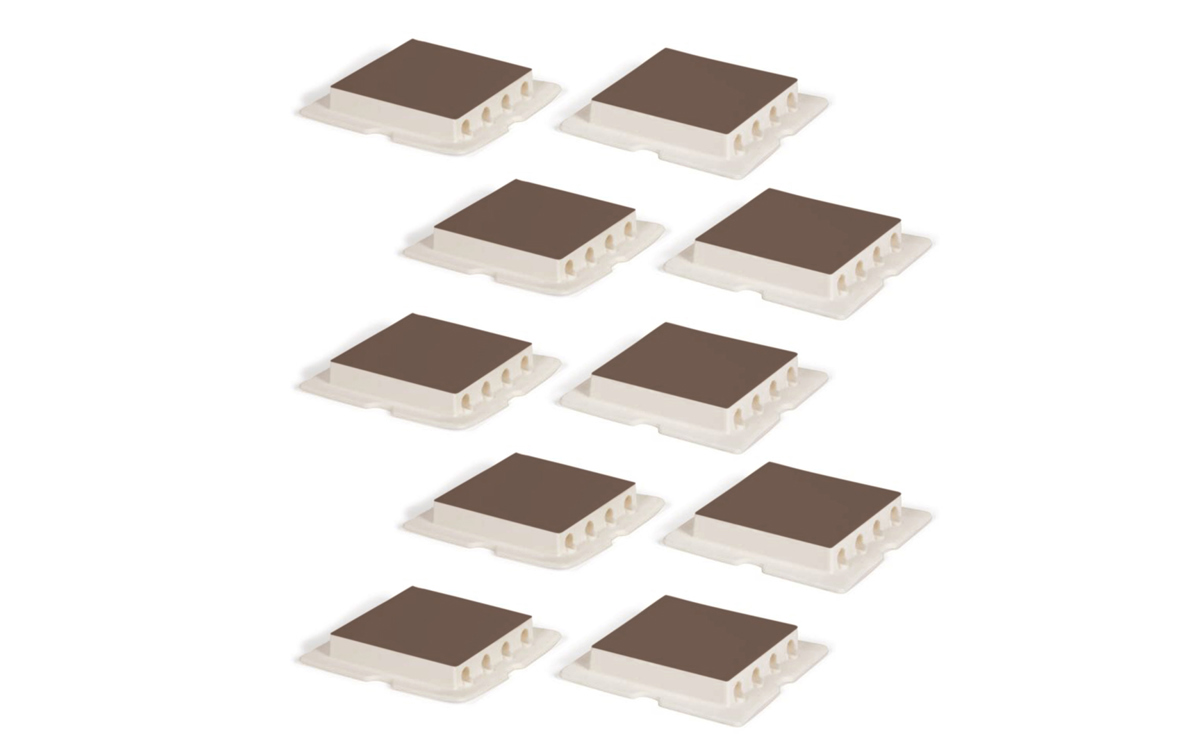
Standard Chest Drain Pads (Pack of 10, Dark Skin Tone)
-
Light
-
Dark
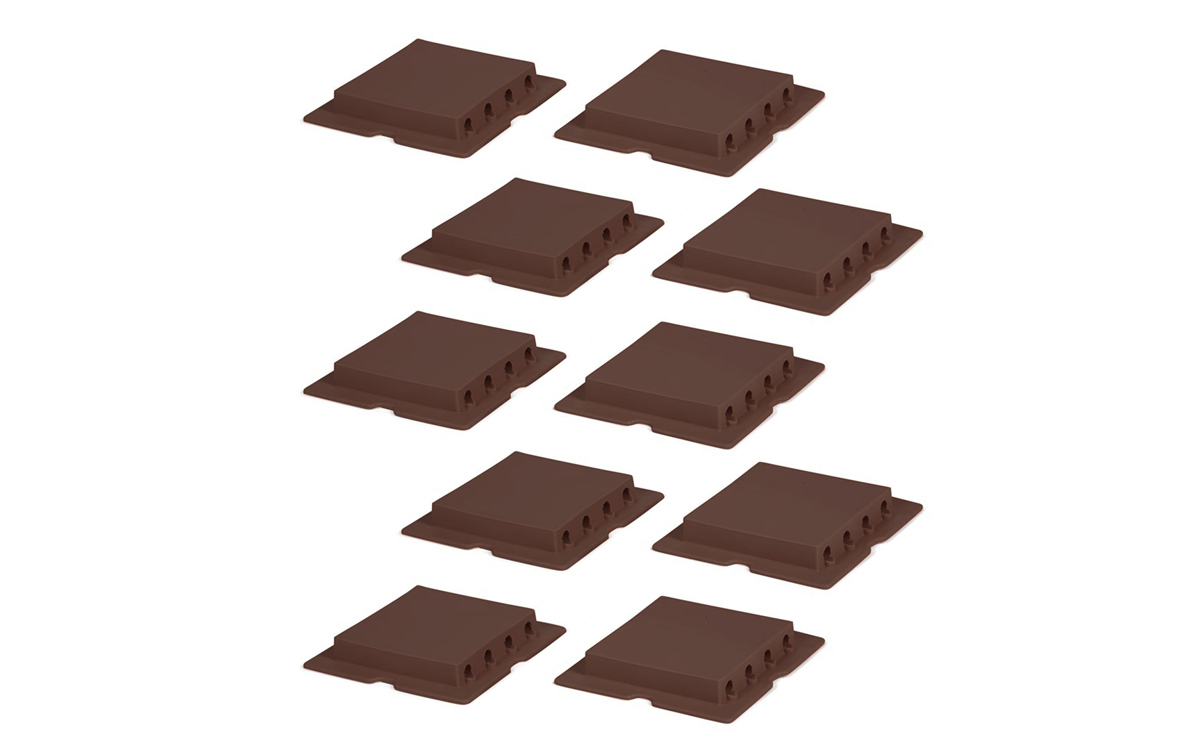
Advanced Chest Drain Pads (Pack of 10, Dark Skin Tone)
References
National Association of State EMS Officials: National Model EMS Clinical Guidelines (2016, page 185): Trauma: If absent or diminished breath sounds in a hypotensive patient, consider tension pneumothorax, perform needle decompression
AAMC Recommendations For Clinical Skills Curricula For Undergraduate Medical Education (2005) (2005, p. 27): Chest tube insertion
Advanced Practice Nursing Procedures (2015, Section six, pages 488 - 491) Margaret R. Colyar : Respiratory procedures: Chest Tubes for Emergency Transport
NHS National Practitioner Program: Matrix Specification for the Physician Associate (2016). p.68: Breathlessness: Perform chest aspiration and chest drain insertion
Specialty Training Curriculum for Core Medical Training, 2013 (p.56): Perform chest aspiration and chest drain insertion
GMC General Surgery Curriculum 2018 (p.67): Technical Skills and Procedures - Chest drain insertion Trauma & Orthopaedics Curriculum 2015 (updated 2018) (p.205): Technical Skills and Procedures, Module 6, Simulation - Chest Drain insertion Cardiothoracic Surgery Curriculum 2014 Module 6, Simulation Techniques - Chest Drain insertion (p. 43)
College of Paramedics, Paramedic Post Graduate Curriculum Guidance (2017, page) Section 3: Advanced Paramedic ...urgent & emergency care, and includes the development and attainment of the following skills, competencies and clinical expertise; ....Chest Drain
ICM Curriculum: Supporting Excellence for a CCT in Intensive Care Medicine, The Faculty of Intensive Care Medicine, 2021.
Trauma & Orthopaedic Surgery Curriculum, Intercollegiate Surgical Curriculum Programme, 2021
Can medical students practice ultrasound techniques during training with the chest drain trainer?
Yes. The Advanced Chest Drain Pads are made of an echolucent material that helps support a wide range of ultrasound simulations. These pads are ideal for practicing the Seldinger technique of placing a tube in the pleural cavity via a guidewire.
Why does the chest tube trainer come with two different types of chest drain pads?
To ensure ongoing cost efficiency for courses, Limbs & Things create the Standard & Advanced Pads to support different training requirements:
- Standard Pads – these foam pads are designed for skin incision and suturing as part of a blunt dissection, and include a pleural layer on the back that has realistic give, and a “pop” on puncture. They also support the use of adhesive bandages
- Advanced Pads – these silicone pads are designed for ultrasound practice. The echolucent material is partially self-healing, allowing for a greater number of guidewire insertions. The pads also support blunt dissection, however, incisions from this procedure will not self-seal
Replacements are available in packs of 2 or 10 (frequency of replacement depends on procedures and efficiency).
Can we use existing supplies with the chest tube simulator and needle decompression simulator, or does it require specific equipment?
This trainer supports a full range of equipment, though there are some recommended items that the trainers have been tested on:
- Advanced Chest Drain Pads – optimal catheter, 12 FG
- Needle Decompression Pads – optimal needle, 21g
Other sized catheters or needles can be used, but the above recommendations will help prolong the life of the chest pads.
Troubleshooting
Our chest drain simulator is leaking fluids
Water leakage is the most common query related to the chest trainer, and usually solved with one of the following:
- Wrong pad – water leaking from around the edge or through the pad - the chest model is supplied with two different types of pad for chest drain procedures, the Standard foam pad, and the Advanced silicone pad. Only the Advanced pad is designed for use with fluids
- Pad end of life – water leaking through previous needle sticks or incisions – Advanced pads support multiple procedures, after prolonged use, the self-healing material will become less effective and will require replacement
- Not fitted properly – the Advanced pad needs to have a good seal to keep the internal water chamber contained. Below are some tips on ensuring there’s a strong seal
Tips:
- Ensure ribs are fitted into the pads to ensure rigidity
- Check you are using the correct rib frame, and it is oriented the correct way (Rib Frames are marked with Left or Right, and an arrow to indicate the top)
- Fit the pad into the frame, the silicone edges should be flush with the inside of the frame
- Place the frame onto the correct side of the chest, the screws should be centred along the notches along its edge
- Place a slotted retaining knob on each screw and hand tighten them (Helpful hint: tighten each knob halfway, then hand tighten them again, so the frame is flush against the torso)
- Using the key supplied, tighten each knob to create a tight seal
Uncommon leakage issues:
- Tubing is not connected securely
- Clips on tubing are not closed correctly
- Cracked casing on the torso’s fluid chambers
If you are still experiencing issues, contact our customer service team for assistance.
You can also check out our Hints & Things video on setting up your Chest Drain & Needle Decompression Trainer.

